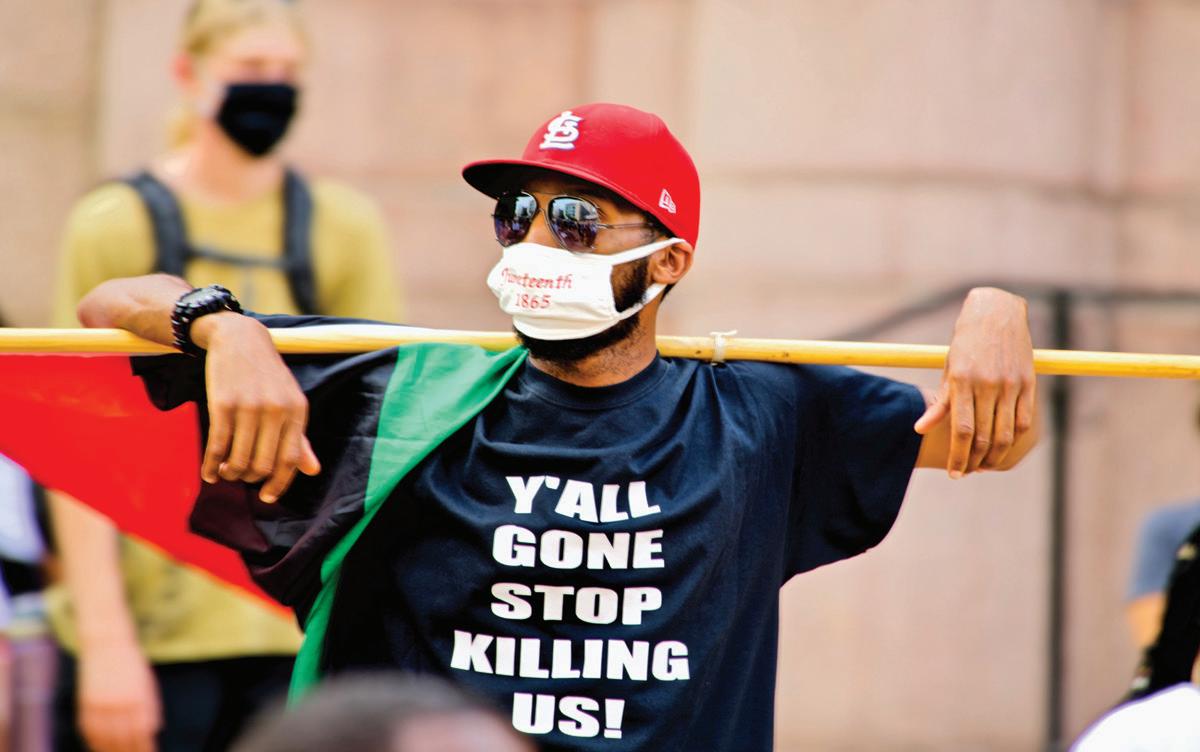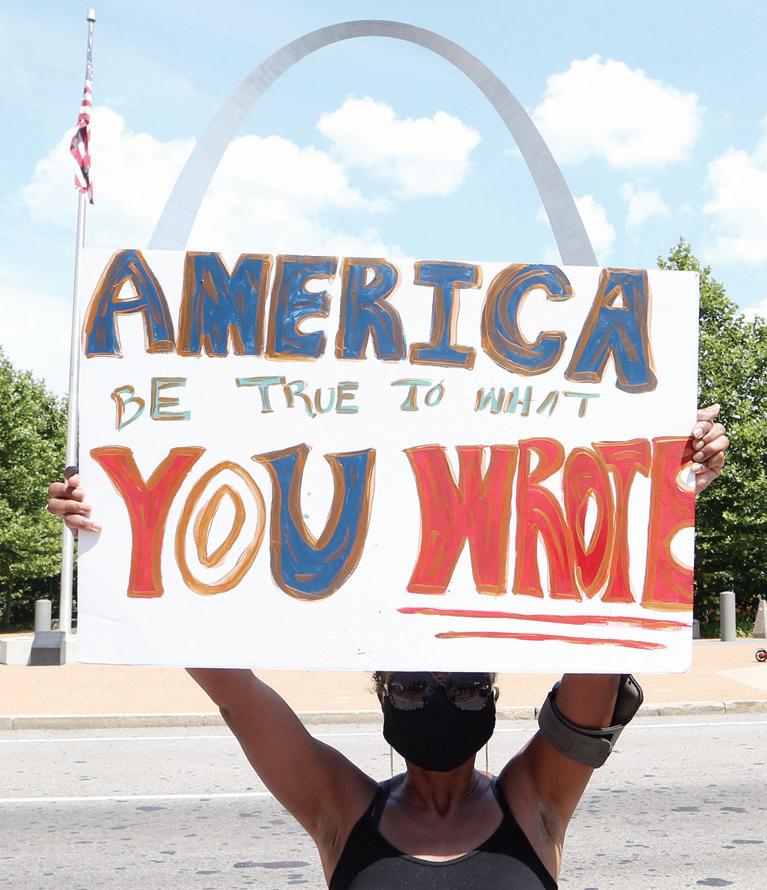






“We are saddened but not surprised. It’s impossible to social distance in jail,” Inez Bordeaux, Close the Workhouse organizer, said of a COVID-19 infection in the city jail.
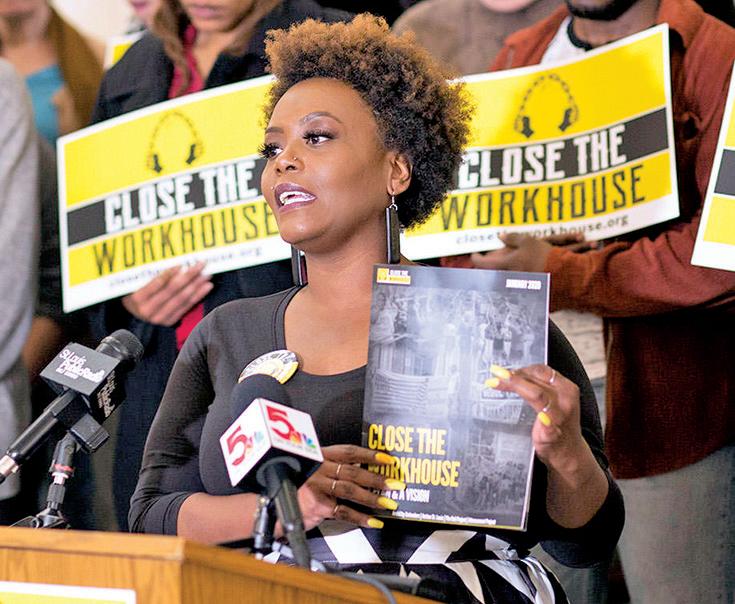
One detainee tested positive, city won’t say how many are quarantined
By Ramona Curtis Of The St. Louis American
A detainee at St. Louis’ Medium Security Institution, known as the Workhouse, has tested positive for COVID-19, according to city officials. A spokesman for Mayor Lyda Krewson said this is the first instance of a city jail detainee testing positive for the deadly virus.
“The Division of Corrections took immediate, proactive measures to quarantine this individual and all
n “How many are being held on nonviolent offenses where those people could be released to go home and that would help reduce the community spread in the city?”
– Inez Bordeaux, Close the Workhouse organizer
not
others they came into contact with,” according to City Communications Director Jacob Long. As of June 24, the Workhouse contains 92 detainees, mostly peo- See
convicted of a crime but are incarcerated because they cannot afford bail

Urban League CEO Michael McMillan: ‘This is the future’
By Chris King Of
By Kenya Vaughn Of The St. Louis American
Black America did what it has done on June 19th since 1865. We celebrated our liberation. Our freedom is not unconditional – hence the nonstop protests underway across the nation for nearly three weeks, motivated by the police killing of George Floyd. But still, it is a freedom that our ancestors were unable to experience for nearly 250 years.
n “On Juneteenth, we celebrate our resilience.”
– Montague Simmons
Four centuries ago, enslaved Africans were shipped here as looted property. They were terrorized into submission and systemically dehumanized for the sake of profit until halfway through the Civil War – a war initiated to ensure that Black people remained in bondage.
Juneteenth 2020 had a different energy because of unprecedented attention on the African American tradition considering the current racial climate, with allies boldly proclaiming that Black Lives Matter. Their doing so helped amplify the message that our people have been expressing collectively since long before the Emancipation Proclamation – and General Gordon Granger’s arrival at Galveston two years later, that we have commemorated annually for generations.
“On Juneteenth, we celebrate our resilience,” Montague Simmons addressed the crowd at The People’s Rally on Friday, June 19 outside
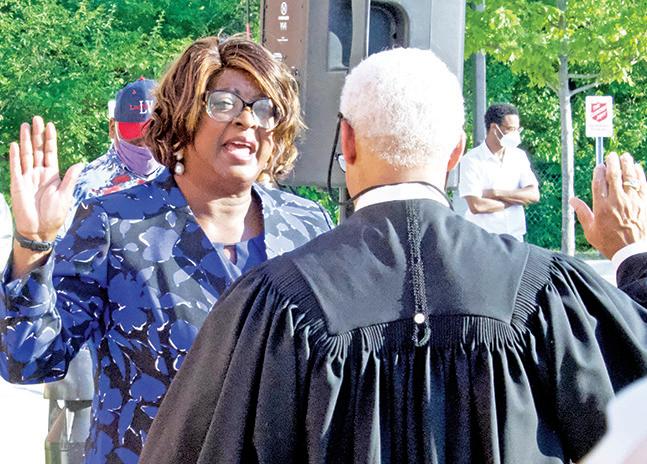
n “Thank you to those who voted for her and gave us the opportunity to be here. It is your challenge to let this not be the end of your time with her.”
– Michael P. McMillan, Urban League
Ferguson’s first Black and first woman mayor was introduced by St. Louis County’s first Black prosecuting attorney, Wesley Bell. She was sworn in ceremonially by Missouri’s second Black chief justice, George W. Draper III. Like most of the speakers, Bell quoted scripture: “Faith without works is dead.” Bell ran alongside Jones for Ferguson City Council in 2015 and served alongside her on the council. He knows her work ethic.
“Pastor Ella, she’s a worker,” Bell said. Jones is a former pastor and a former leading Mary Kay cosmetics salesperson. Her church and her Mary Kay families came out
By Rebecca Rivas Of The St. Louis American
One question changed everything for trauma surgeon Dr. LJ Punch: “Where you at?” In 2016, Punch was a panelist at a community forum on gun violence, hosted by Better Family Life. It was just six months after Punch arrived in St. Louis, and Punch’s new employer Washington University School of Medicine had a gun-violence initiative. Punch had just been

Miss Robbie claims to be estranged from grandson
Miss Robbie Montgomery, of Sweetie Pie’s and “Welcome To Sweetie Pie’s” fame, wished her grandson Timmy a happy birthday on June 22. In the caption of a photo that featured the two of them smiling, Montgomery implied that Timmy’s mother is keeping him from Montgomery’s side of the family.
“Happy Birthday Timmy! Grandma love you even though I can’t see you. Your daddy side of the family misses you and one day we’ll see you,” the caption read.
Montgomery also shared videos where she claimed that money disputes were behind the estrangement.
“It’s all about money, and I know I’ve spent a lot on TJ, so if it ain’t about money, what is it about,” Montgomery asked in one of the videos.
“Every mother wants their child to be with their father, so what’s the problem?”
In an Instagram post, Jenae Shivers, who has since become happily married and has a son with her husband, allowed her IG followers to hear her side of the story.
“I’ve been holding my tongue for nine years, but I’m done,” Timmy’s mother Shivers said.
“What do you want to know?”
Followers posted a series of anonymous questions.
“What happened to his relationship with his grandmother?” one follower asked.
“Tim (Timmy’s father and Montgomery’s son Tim Norman) happened,” Shivers responded.
“Do you and Miss Robbie have a good relationship?” another follower asked.
“We did until recently,” Shivers said. “Still I never kept Timmy from her. Timmy, AJ (Shivers’ son with husband) and I were just at her house two weeks ago.”
Another follower asked why she keeps Timmy from Montgomery’s side of the family.
“Three of his cousins just left my house. I don’t keep Timmy from that side,” Shivers said.
She also said that Timmy and his father Tim Norman haven’t had a relationship in four years.
“Why are you guys putting personal family business on social media?” another follower asked.
“I am only responding to stick up for myself,” Shivers said.
“Timmy is my number one priority, and no one is going to make me out to be some thing that I’m not.”
Shivers then went on to share messages and images that were exchanged between her and Montgomery.
“Please stop putting yourself
in the middle between Tim and I,” one of the messages Shivers sent to Montgomery read. “I love you and have no issues with you. Timmy and AJ love you too.”
Pennsylvania’s Supreme Court ruled Tuesday that Bill Cosby can appeal two key issues in his 2018 conviction on sexual assault charges. Cosby, 82, is less than two years into a 3-to-10-year sentence at a prison outside Philadelphia for drugging and sexually assaulting a former Temple University employee at his home in 2004.

Tuesday’s ruling grants Cosby the ability to appeal two issues in the case. One issue focuses on the “prior bad act” witnesses who testified about alleged assaults that were not part of the charges, and the second focuses on the prior district attorney’s decision not to charge Cosby more than ten years ago.
The criminal case centered on a former Temple University employee, Andrea Constand, who told police about the assault in 2005.
Prosecutors initially declined to press charges, and Constand and Cosby settled the case in civil

court a year later.
A new team of prosecutors took up the case and, relying on Constand’s and Cosby’s statements in the civil deposition, arrested him in December 2015.
A first criminal trial against Cosby ended in a hung jury. But in April 2018, Cosby was convicted of three counts of aggravated indecent assault for drugging and assaulting Constand. In December, the Superior Court of Pennsylvania upheld the convictions and rejected his argument that the case was wrongly decided against him.
Hurricane Chris charged with second-degree murder
Rapper Christopher “Hurricane Chris” Dooley of Shreveport is free on bond following his arrest last Friday in connection with a man’s shooting death.
Dooley, 31, was booked into the Shreveport City Jail on a charge of second-degree murder following a shooting at a gas station. Dooley posted bond Sunday and was released.
According to the Shreveport ABC affiliate, Dooley was arrested after the deadly incident that happened just after 1 a.m. Friday at the Texaco convenience store in the 2600 block of Hollywood Avenue. KTBS.com said that early reports from Shreveport police indicated a man who was at the store said he shot a man that he thought was trying to steal his vehicle. The victim suffered multiple gunshots and was taken to a local hospital, where he later died.




‘Avery’s words demonstrate he is tired of St. Louis police’s racism, violence’
By Rebecca Rivas
Of The St. Louis American
Ferguson activist Michael Avery is once again a free man, after a federal judge dismissed the charges against him at the request of Michael Reilly, the federal prosecutor assigned to the case. Avery had been charged with incitement to riot based on Facebook posts. The charges were dismissed “without prejudice,” meaning they could be issued again. In his motion to dismiss, Reilly said the investigation of Avery is ongoing.
“Even though they state the investigation is ongoing and they could refile charges, we are hopeful that they will realize that this prosecution has no basis in law,” Marleen Suarez, Avery’s attorney, told The American Though the government’s case against Avery never got past a couple of bond hearings, these hearings were revealing. They revealed nothing of Avery’s alleged criminality, for which Reilly presented no evidence. They revealed a great deal about the St. Louis Metropolitan Police Department’s notorious bike patrol and the absurd lengths a federal prosecutor was willing to go through to protect them against one black man with a point of view and a gun he legally owns and carries.
Reilly’s fight to get U.S. Magistrate Patricia Cohen to keep Avery in jail without bond focused largely on one controversial figure — Lt. Scott Boyher, who leads the city’s police bike patrol.
In a May 1 Facebook video, Avery is heard telling Boyher that Boyher took selfies with Avery when he arrested Avery at another protest. Avery then said that if Boyher was looking for any “type of confrontation,” that he could come find him at his house. But Boyher should “remember his age” because he doesn’t want him to “retire too early.”
Reilly argued that this was Avery making a threat on Boyher’s life, though police never arrested Avery or sought criminal charges for making these statements.
“The lieutenant was very direct and said, ‘I take his language and the fact that he has a firearm as a threat that the defendant would shoot me if given the opportunity,’” Reilly said.
After prodding from Cohen, Reilly conceded that it was legal for Avery to openly carry a weapon in a shoulder holster because he does not have any felonies on his record.
Boyher is currently named in at least 15 pending federal lawsuits, said attorney Javad Khazaeli, who is representing clients in these cases. All
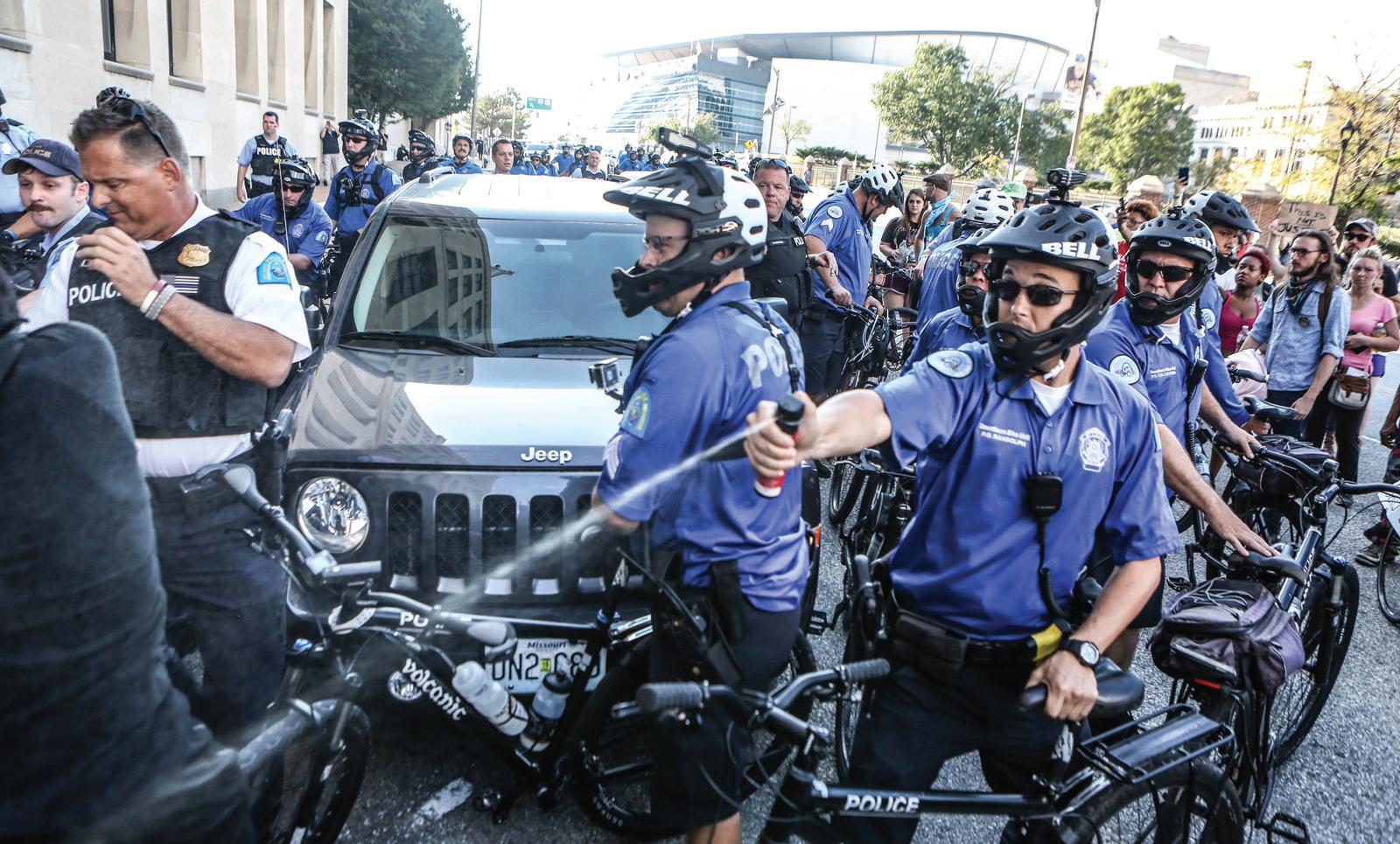
n “Trump’s lawyers can never muster the courage to prosecute police officers who repeatedly terrorize those protestors who insist that black lives matter.”
– Tony Rothert, ACLU-MO
stem from protests following a judge’s verdict that former St. Louis police officer Jason
Stockley was not guilty of firstdegree murder in the killing of Anthony Lamar Smith in
2011. There is video evidence of Boyher pepper-spraying two protestors — Alison Dreith and Derek Laney — using a large canister of the chemical weapon, Khazaeli said. A police commander testified in an ACLU lawsuit that officers never use the large canisters on protestors because they drench people with the chemical.
Boyher was also part of a federal lawsuit, where a judge found that Boyher made an unconstitutional arrest of a St. Louis school teacher after the Women’s March in January 2017. The woman was
If you request an absentee ballot, this form may be returned to your
MAIL-IN BALLOT REQUEST (NOTARY REQUIRED FOR ALL MAIL-IN BALLOTS):
❏ Any registered voter can request a mail-in ballot. If selecting this option, this form must be delivered to your
I do solemnly swear that all statements made on this application are true to
Signature of Registered Voter:
standing near the curb on the street, trying to talk to Boyher when she was handcuffed and arrested. Police then drove her to an alley where nine to 12 officers took pictures with her, telling her to smile though she was crying, the judge’s opinion states.
“The city’s notorious bike patrol is well known for bullying and harassing those who dare to criticize unwarranted and excessive violence by local police,” said Tony Rothert, legal director of ACLU-MO. “Mr. Avery’s words demonstrate that he – like many others – is tired of the St. Louis police department’s racism, violence, and lack of accountability.” Rothert and Khazaeli both pointed out that the FBI and U.S. Attorney’s Office have made no moves in more than 100 cases of protestors who were allegedly unlawfully beaten and maced by police during Stockley protests.
“Talking to a police officer in a rude way is not enough to support keeping a person in jail without a chance of relief,” Khazaeli said. “Yet when those same officers are identified on video violating the civil rights of more than 100 St. Louisans, this prosecutor’s office has sat on his hands for over two years. I am heartened by the fact that this federal judge saw through the bluster of made-up, unsubstantiated allegations.” Rothert said, “It is disappointing that Trump’s lawyers are prosecuting Mr. Avery for words, but can never muster the courage to prosecute police officers who repeatedly terrorize those protestors who insist that black lives matter.”
We still have nothing to lose but our chains
This weekend Neighbors of Fountain Park, in collaboration with Centennial Christian Church, hosted their 14th annual Juneteenth Community Celebration in Fountain Park, a tiny pocket park just northeast of the intersection of Delmar and Kingshighway boulevards. For more than a dozen years, this has been St. Louis’ most consistent celebration of Juneteenth, which commemorates the end of race-based chattel slavery in the United States in 1865. The more iconic Emancipation Proclamation of 1863 was a war move that only proclaimed as emancipated the enslaved people in the secessionist states –states, needless to say, that no longer recognized the authority of the president who issued the proclamation.
Despite the publication of a posthumous novel of the name by the great Ralph Ellison near the end of the 20th Century, Juneteenth has remained something of a Black community secret. The Neighbors of Fountain Park has kept a public flame lit, the Missouri Historical Society has hosted celebrations, and for years Curtis Faulkner lobbied for a statewide festival in Missouri, but 2020 was the year Juneteenth went mainstream. “Juneteenth 2020 had a different energy because of unprecedented attention on the African-American tradition considering the current racial climate, with allies boldly proclaiming that Black Lives Matter,” Kenya Vaughn reported for us. “Their doing so helped amplify the message that our people have been expressing collectively since long before the Emancipation Proclamation – and General Gordon Granger’s arrival at Galveston two years later that we have commemorated annually for generations.”
Montague Simmons, a veteran local grinder for Black liberation, spoke our community’s feelings well at a Juneteenth People’s Rally outside St. John’s United Church of Christ. “On Juneteenth, we celebrate our resilience,” Simmons said. “It is that will and our ability to build impactful movements of resistance that give shape to what it means to be Black, to be powerful and to be free – unapologetically.” He went on to quote an open letter from Movement For Black Lives National Field Director Karissa Lewis that appeared on ESSENCE.com in commemoration of Juneteenth. Lewis wrote that we celebrate “our unrelenting dedication to Black people, to our own freedom and to each and every victory in the face of constant violence. Our memory is long, but we will always remember and honor our ancestors.”
In St. Louis, we do not need to look back to the 19th or even the 20th century for ancestors of the burgeoning movement for Black liberation we see going mainstream now. The protest organizers of 2020 mobilizing thousands of diverse protestors of police violence against Black people are leading a third wave of 21st century protest in St. Louis. They are renewing righteous energy first put in the streets of Ferguson in 2014 after the police killing of Michael Brown and in the streets of St. Louis in 2017 after the exoneration of killer cop Jason Stockley. Some of those previous organizers are, indeed, ancestors, in the sense that they are no longer living; Darren Seals, to name one Ferguson protestor we lost, was memorialized in a Father’s Day march over the weekend. Some moved away to national platforms. Other Ferguson and Stockley verdict protest organizers are still active locally and organized protests this past weekend. Whether still working among us or tragically departed, we will always remember and honor those who put their

bodies in the street and called others to disrupt a status quo maintained by the destruction of Black lives and marginalization of Black destinies.
“Never has there been a time in United States history when the police were not a force of violence against Black people,” Karissa Lewis wrote to and for all of us. “In the South, policing started in the form of slave patrols, whose purpose was to catch and return fugitives from slavery. In Northern states, the first police departments in the mid-1800s quashed labor strikes and riots against the abuses of the wealthy. This is their legacy, their rotten core.” Those who rush to defend, rather than defund, the police at this historic moment are defending violence against Black people, whether they know it or not. We salute the Movement for Black Lives and everyone in the street today for striving to make sure more people know this to be true.
The call to Defund the Police is part of a call for systemic reform of American institutions with an unprecedented commitment to achieve equity. We are demanding not just equality on paper, but equity in the courts, in the protection and enforcement of civil rights, and through the equitable distribution of resources to the African-American community in some form of reparation. Juneteenth is more than a memorial for those we’ve lost in a war we’re still fighting, though it is that. Juneteenth is the renewal of a duty set forth by Assata Shakur in words now chanted on the streets of St. Louis and all over the world: “It is our duty to fight for our freedom. It is our duty to win. We must love each other and support each other. We have nothing to lose but our chains.”
By Mike Jones Of The St. Louis American
America is obviously having a Man in the Mirror moment on the issue of race as the result of the police murder of George Floyd. In the ensuing three weeks we have seen multiethnic, multiracial mass protests against the system of American policing. These protests have not only touched every corner of America but have also gone global.
While white America is having this moment of introspection, the black community is long-overdue for a film session to review how we’ve politically performed for the last 30-40 years. We have a pressing strategic political challenge: what adjustments do we need to make to our game at this moment?
Professional athletes regularly have to develop two sets of things simultaneously: their physical conditioning and skills and their understanding of the game and how they’re playing it. They understand their game by studying film of their play and then make adjustments based upon what they learn.
The film session we need is to review the performance of African-American elected officials. The public policy that affects our lives is a function of local, state and federal government. The people who create and execute those policies are elected and appointed government officials. These are players in the political arena where policy is made.
A major premise of the Civil Rights Movement was if black Americans could guarantee their right to vote, they could
elect representatives (players) who could advance policies that would improve their quality of life. What was the impact of the 1965 Voting Rights Act?
black community that have a public policy solution could be implemented it should be Atlanta.
By Comptroller Darlene Green For The
St. Louis American
It was August 9, 2014 when Michael Brown was shot and killed by police in Ferguson, Missouri.
This year, on March 13, EMT Breonna Taylor was shot and killed by Louisville police while sleeping in her own home. The police were at the wrong house – looking for two suspects who were already in custody. Then on May 25, George Floyd was choked to death with a police knee on his neck in Minneapolis for 8 minutes and 46 seconds over a counterfeit $20 bill. He was not armed. He had already been restrained. And still he was treated by law enforcement as if his life did not matter. Or worse, as if his life—like the lives of countless other persons of color—was there for the taking.
Back in 2014, I wrote that “there must be zero tolerance for police shooting and killing unarmed black civilians.”
Many people began to call for transformative change to policing with retooling (adding

body cameras) and retraining. But today law enforcement continues to operate on black communities, not for black communities. The public outcry in 2020 is unlike 2014 and unlike any before, from big cities to small towns and around the world. With the proliferation of cell phone cameras and social media, a diverse coalition of more and more Americans are becoming involved and embracing the Black Lives Matter movement. We must get to work on real transformative change that involve accountability and transparency. That is why I’m introducing a resolution at the Board of Estimate and Apportionment to advance, in part, the following Accountability Actions for Police in the city of St. Louis: • elimination of the use
of excessive force, including deadly force, against persons who are unarmed, subdued, or otherwise possess inferior force;
• development of an Officer Conduct Accountability Registry; identifying police officers who have engaged in misconduct that calls into question their ability to serve as impartial enforcers of the law;
• promote a Zero Tolerance Accountability Action Plan for police brutality towards unarmed members of the community equivalent to ending qualified immunity for police so as to provide equal justice under the law.
Not all of our decisions will be easy, and some changes will not happen overnight; but we must not let what is difficult paralyze us.
Asking for zero tolerance in excessive deadly force in police brutality is a big step, but it is a necessary action on our path to achieve equal justice under the law.
Darlene Green is comptroller for the City of St. Louis.

In 1970 there were approximately 1469 elected officials in America; in 2010 the Joint Center for Political and Economic Studies estimated there were approximately 10,500. In Congress we’ve gone from 10 black representatives and no senators to 52 representatives and three senators. You could argue we’ve done even better in large urban areas where the majority of African Americans live. It’s almost impossible to name a major American city that has elected no AfricanAmerican mayors, and no major city lacks a critical political mass of AfricanAmerican council members. Over the last 30 years, we have not suffered from a lack of numerical representation. So why haven’t we made the progress in the public policy arena that everyone black thought would happen if we got chance to vote and elected people who looked like us?
Atlanta elected its first black mayor, the legendary Maynard Jackson, in 1973 and hasn’t had a white mayor since, and it’s had a majority of African Americans on its city council for decades. Atlanta’s reputation for economic inclusion for black folks has reached mythic proportions. If there is any place in America where the problems of the
Remake, reorganize, refocus police
Defund the police! That’s a rally cry heard recently from social activists in many cities, St. Louis included. Defunding police departments would equate to eliminating them. Not only is that an impractical solution to real problems, it surely would result in some form of anarchy. A concerted effort to remake, reorganize and refocus the mission of police departments is a more likely course of action.
St. Louis is in dire need of a police agency that is responsive to its citizenry. Changing the culture of the police department is a first step, but one paramount to success. The St. Louis P.D. is an organization beholden to the “Who-do-you-know?” management system. The department’s operating premise can be viewed as a 3-legged stool: nepotism, cronyism and favoritism.
So, eliminating the ability of influential people to manipulate the hiring, assignment and promotion of police personnel will be a necessary step, but only one step, toward cobbling a truly professional police department. But be forewarned: nepotism, cronyism and favoritism will not go quietly into oblivion.
Michael K. Broughton Green Park
Refocus on the Ferguson Commission report
People are taking to the streets here in St. Louis to exercise their right to peacefully assemble and to demand accountability from institutions like police departments and government
Then why is it that just now – in mid-June 2020 after three weeks of nationwide demonstrations and the latest Atlanta Police killing of Rayshard Brooks – Mayor Keesha Lance Bottoms signed an executive order that begins to restrain the use of unjustifiable deadly force against the black community by the Atlanta Police Department?
There are currently 52 African-American members of the U.S. House of Representatives (there were 10 in 1969); they represent 22% of the Democratic Caucus. This means no Democratic priority can pass in the House without their unanimous support. The House will pass the George Floyd Justice in Policing Act of 2020. Democrats, with African-American members of Congress out front, will take a victory lap. But they should answer why it has taken this long and these circumstances to get police reform on the Democratic agenda. Players look at game film to play better. Coaches look at game film to evaluate player performance. While there are often mediating circumstances when a team fails to meet expectations, usually it’s because your players need to get better or you need to get better players.
As it relates to the AfricanAmerican political class, it’s past time for the black community to look at the political game film the way coaches do. And the tape don’t lie. Pull
All letters are edited for length and style.
bodies. I support my neighbors in exercising these rights and I join with them in their calls for equity and justice. I urge law enforcement officials, and other leaders to listen and to focus on de-escalation techniques to keep everyone safe during this time.
As a government official, policymaker, and mom of a white son, I know I have a duty, responsibility, and moral obligation to act. One action is the talk that I need to have with my son; I know it is very different than the talks that black moms have with their own sons every day. I also know that my actions, at home and elsewhere, must be paired with deep listening, learning, and direction from those whose life experiences have been vastly different than my own. The Ferguson Commission report should continue to be a resource for all of us in St. Louis as we seek to build a community in which we can all live our best lives. It documents the results of hundreds of hours of community listening sessions, combined with history and calls to action, many of which have yet to be acted upon. I urge my colleagues in County government and beyond to join me in re-focusing on this important body of work.
Lisa Clancy, chairwoman St. Louis County Council Maplewood




Zoo
accepting reservations
The Saint Louis Zoo reopened to the public Saturday, June 13 with limited attendance. Protective masks are required, and no cash will be accepted. All guests must now reserve free, timed tickets prior to visiting. Reservations and guest information are available at https://www.stlzoo.org/.
The three national credit reporting agencies – Equifax, Experian, and Transunion – are giving people weekly access to monitor their credit report — for free. Your credit report has information about your credit history and payment history, information that lenders, creditors, and other businesses use when giving you loans or credit.
To get your free reports, go to AnnualCreditReport.com. The credit reporting agencies are making these reports free for the next year. If you think you find any errors, the FTC has guidance for dealing with that; visit https://tinyurl.com/credit-report-errors.
Source: the FTC

When the marches end, will you remain awake?
By Tiffany Anderson For The St. Louis American
If, like me, you stand as one of few black people in your field speaking out about race, the “angry black woman or man” label may be used to silence you. If that happens, embrace the “angry” label and channel it to make changes in policies and practices.
Be angry to view black men and women being killed. Be angry at the over-identified, brilliant black children being labeled as learning-disabled or emotionally disturbed, resulting in dumbing down what students learn. Productive anger transforms systems. Complacency is the enemy.
On May 25, 1787, the U.S. Constitution, drafted at the Constitutional Convention, outlined the promise to establish justice, ensure domestic tranquility and secure the blessings of liberty. On May 25, 2020, 235 years later, we were reminded of promises unfulfilled as the nation witnessed a public lynching in the streets of Minneapolis. It awakened the conscience of a nation asleep.

The voices screaming, “I can’t breathe” ring in the ears and hearts of black and brown children and adults. The images have awakened the spirit for many to call for justice. Do not let another 235 years pass, missing an opportunity to transform this country to be the inclusive place our ancestors fought and worked for, as we live in a nation built on the backs of slaves. Backs bent by systems carrying oppressive bricks must have those bricks thrown out, empowering all to stand upright.
As our challenge to systems, in Topeka Public Schools, we are hosting our own equity talks for staff and students and we are leading broader talks across the state with the five black superintendents invited to join in to educate, empower and engage others in transforming systems. We are also are a participant in the national Education Equity talks with superintendents, sponsored by Discovery Education, and we encourage the public to tune in. The key will be not to stop at conversations, but through those talks gain ideas, resources and be prepared to challenge systems of inequity resulting in true transformation.
Dr. King described how Rip Van Winkle slept through a revolution, and we must be alert with a discerning spirit through this revolution. When awakened suddenly to something eyes were closed to for so long, falling back asleep can be easy if we allow it. It is simpler to ignore or deny the privileges that divide groups into categories of them and us than be confronted with implementing solutions. Unconscious bias speaks to acting with a level of automation with bias and not even realizing it.
Breathing in this air has filled people with the unapologetic desire to challenge systemic racism in this moment of questioning the moral and human connection we have to one another to truly be our brother’s keeper. But, when the marches end, when America gets back to its routine, will you remain awake?
We can’t breathe when lynchings masked in the form of systemic racism that reduces access and opportunities occur. We can’t breathe when the Godgiven opportunity to live can be snatched from you at any moment. We cannot breathe when silence, disregard and removal of opportunity and access are the norm.
Challenge, question, use every breath you have to be the voices of the unheard at the polls and in the spaces you occupy. Faith must overcome fear and we must become our brother’s keeper or we all will be suffocated with the knee of injustice on our neck.
Tiffany Anderson is superintendent of Topeka Public Schools.

Continued from A1
particularly well from my standpoint, because my white coat and long answers were not inspiring to anybody — James Clark came up to me,” Punch said. “I shared with him that he knew my boss. And he said, ‘Yeah, I know your boss. Where you at?’” The disconnect between the two worlds — the community and hospital — was jarring, Punch remembers.
“That’s when I decided to match and marry a public-health campaign with this boots-on-the-ground program that Mr. Clark was starting, the gun violence de-escalation program,” Punch said.
STOP THE BLEED is a national campaign that was launched after the tragic shooting at Sandy Hooks Elementary in December 2012. Through free courses, anyone can learn how to stop life-threatening bleeding in emergency situations.
“While it’s wonderful and important, mass shootings represent only 2 percent of all gun violence,” Punch said. “How can we take this wellthought-out approach and apply it to communities where gun violence is not an ‘if,’ it’s a ‘when’?”
It took about two years of discussions with Clark and his team of outreach workers before they had their first class. It was led by Punch, along with medical student Jane Hayes and Dr. Erin Andrade. While
Continued from A1
while they await trial.
City and health department representatives did not respond to phone call or email inquiries about how many of the 92 detainees have been tested for COVID-10 and how many are quarantined. Long did say the city “will continue to aggressively follow the recommended CDC guidelines for correctional facilities and has already
attendees liked learning about how to use a tourniquet to prevent bleeding and other medical skills, the more powerful moment came when the class received certification cards to put in their wallets, Punch said.
“People were holding up their cards, walking around saying, ‘I’m certified,’” Punch said. “That experience really brought home for us a couple really key principles. One, radical generosity. We have to undo this sensation of distance and scarcity — and instead infuse people with the idea that you are enough and can act as a helper on the scene wherever you are.”
The second principle was being accessible to people, which often goes against the numerous boundaries commonly experienced in health care, Punch said.
In the first year, Punch’s team certified 3,000 people in these life-saving skills at schools, churches and other community events. Since the program started, they’ve instructed 8,000 people and provided just as many medical kits along the way — including to many teenagers. That effort led to the opening of The T, at 5874 Delmar Blvd. The logo — a capital T with a slash going through it — was meant to look like a tourniquet.
“But it ended up looking more like ‘No more trauma,’” Punch said. “Since we’ve been at The T, our platform has gone way past STOP THE BLEED.” It now includes youth nights, classes on opioid overdose, and programs to aid recovery, emotionally and physically, from
begun providing additional testing opportunities for all detainees and staff.”
According to the carpenters union, which represents about half of the corrections officers at the Workhouse, the city’s Division of Corrections notified them of the detainee’s positive status and informed them that staff and detainees were being tested for the coronavirus.
However, they do have concerns for their members.
“We have worked closely with the department to make sure that administrators are
bullet injuries.
‘Stop the virus’
“So, the T is wonderful,” Punch said. “We’ve got programming, volunteers, students — and then the pandemic hit. And everything we had based our space on was proximity.”
Interestingly, Punch’s team had established an international trade and supply chain for the trauma first-aid kits. In January, they learned that the pandemic was really serious, so they decided to shift gears.
turned The T into a sterile room to make the kits.
“Many weeks later, I don’t know how many thousands we’ve reached in partnership with PrepareSTL,” Punch said. COVID-19 reinforced a powerful concept for the team.

“This is coming,” Punch remembers thinking. “It’s going to be very similar to violence because it will take advantage of those who don’t have what they need. And maybe we’re in a position, the same way we were to stop the bleed, to now stop the virus.”
Dr. LJ Punch founded and directs Power4STL, a non-profit that focuses on four areas: bullets, COVID, homelessness and opioids.
They shifted their purchasing to Personal Protection Equipment (PPE), including masks and gloves, and began making Stop the Virus kits. They crossed paths with PrepareSTL — a regional governmental outreach campaign that gives out PPE and educational resources on COVID19. So, they joined forces and
using every possible safety precaution for the welfare of our corrections officers and anyone they come into contact with while at work,” union representative Jeff Haantz said in a statement.
Earlier this month, 18 detainees and 14 staff at the Hogan Street Youth Center were tested positive for COVID-19, according to the Missouri Department of Social Services. Organizers and union officials called for the center to be shut down. The news of a coronavirus
“If you are surrounded by bullets, if you are surrounded by a virus, if everyone around you doesn’t have what they need in terms of their nutrition, if pain and trauma are the lived and breathed norm, it can seem as the only choice you have is to succumb to it,” Punch said. “We say, ‘No, no, no.’ With the right training, with the right equipment — whether a tourniquet or a mask or a Narcan or a bandage — you have the power to change the outcome.”
‘Trauma surgeon in recovery’
“I’m a trauma surgeon in recovery,” Punch said. “I have been there when many, many beautiful black men have taken their last breaths, all due to the impact of violence. I have gotten to a point where I can no longer accept that fate for my people, having seen the power people have when you simply
infection at the Workhouse comes following a years-long Close the Workhouse campaign to shut down the notorious facility known for inhumane conditions. The majority of the people jailed at the Workhouse are poor and Black.
Close the Workhouse organizer Inez Bordeaux said the community knows of other COVID-19 cases at the Workhouse. She questions the city’s transparency in disclosing complete information about detainees.
“We know there is no
take the time to be present, teach and give. I am so compelled by both that strength and so disturbed by the horrors I’ve seen, I can no longer sit inside the walls of the hospital and be satisfied.”
On July 1, Punch will be moving the work outside the walls of the hospital and will be working full time in what Punch calls “community health.” Punch will work through the T and a newly established nonprofit, Power4STL, to focus on four areas: bullets, COVID, homelessness and opioids.
“They are all areas where I find both tremendous resilience and profound suffering,” Punch said. “I’m going so far as to take my office on wheels.”
Punch bought a used ambulance to move within the community. But the end game is The BRIC — Bullet Related Injury Clinic, which Punch hopes to open by the end of the summer. The clinic will serve the needs of people who have experienced a bullet injury and are being discharged from the hospital. More than 2,000 people experience bullet injuries in this region every year, Punch said, and half of them are discharged from the emergency room without being admitted.
“Frequently, their wounds are superficial enough that they don’t require surgery, but they are still deep enough that they completely disrupt a person’s wellbeing,” Punch said.
When they are discharged, they are often forced into the very difficult task of caring for their wounds themselves. The pain is immense, and often
way this is the first person to test positive inside of the Workhouse for coronavirus,” Bordeaux said. “So, we are saddened but not surprised. It’s impossible to social distance in jail.”
Bordeaux said a positive coronavirus test for a Workhouse detainee is a public health problem in a growing global health crisis.
“How many of those (92 detainees) are being held on nonviolent offenses where those people could be released to go home and that would help

fragments of the bullets are left in the body.
“The thing is it doesn’t just limit itself to the bullet track,” Punch said. “It impacts the family and it hurts one of our most essential components of wellbeing — the need to belong or connect to others. Because when someone shoots a piece of metal into your body intended for your death, and you then walk around with that hole, scar or even that metal still in you, it’s very, very difficult to believe the world is a place in which you are safe.”
For all this profound work and impact in the gun violence and COVID-19 pandemics, Punch is receiving the 2020 Stellar Performer in Health Care at the virtual Salute to Excellence in Health Care Awards event on July 9. The St. Louis American Foundation’s annual Salute programs help foster more than $1 million in local minority scholarships each year.
“Making the decision to move beyond the walls of the hospital and into the community was one of the richest, most amazing decisions I made — that I didn’t necessarily realize I made,” Punch said. “That’s how all this got started — was me simply trying to answer the call, ‘Where you at?’”
The 20th Annual Salute to Excellence in Health Care Awards will be celebrated online as a free virtual event at 7 p.m. on Thursday, July 9. For additional details and to register, visit givebutter.com/ salutehc.
reduce the community spread in the city?” she asked. The Close the Workhouse campaign has been gaining momentum from a renewed Black Lives Matter movement and public pledges of support from city Treasurer Tishaura O. Jones, Comptroller Darlene Green, and 14 of the city’s 28 Aldermen. Ward 20 Alderman Cara Spencer said closing the Workhouse is also about practical and economic factors, in addition to containing the spread of the virus.
“I wouldn’t point to the COVID case as necessarily to advocate closing the workhouse because people see closing the workhouse as ‘freeing all the prisoners.’” she said. “What is making it palatable to some of the aldermen is that we can close (the Workhouse) without doing that.”
The Close the Workhouse campaign has presented a comprehensive plan that provides both economic and practical solutions to closing the city jail:
Combine the city jail population into one facility. Both city jails are under-capacity because of a declining jail population. By moving the current 92 Workhouse detainees into the City Justice Center, which has a current population of 664, the total population would be 756. That would be well under the 860-capacity of the City Justice Center. Stop housing federal detainees. The city is required by law to detain people charged by the state but not those with federal charges. There are currently 220 federal detainees in the city jails that can be housed in other jails.
Move resources out of the jails and into the community Organizers say that the $8 million currently proposed in the 2020 city budget for the Workhouse can be used for mental and addiction healthcare, pretrial services, affordable housing, and economic and educational opportunities.
Spencer, who announced her candidacy for mayor in January, attempted earlier this month to introduce an amendment into the city budget that would defund the Workhouse.
“We have an amendment we prepared that would zero the budget for the Workhouse,” Spencer said. “I introduced it in committee last week and the Ways and Means Chair [Joe Vollmer] wouldn’t even entertain an amendment.” Spencer said that she will be re-introducing the budget amendment when it is discussed by the full board in an upcoming budget meeting.
For more information about the Close the Workhouse campaign, go to www.closetheworkhouse.org.
Continued from A1
St. John’s United Church of Christ. “It is that will and our ability to build impactful movements of resistance that give shape to what it means to be Black, to be powerful and to be free – unapologetically.”
The rally was the first of more than a dozen events related to Juneteenth that took place across the St. Louis region.
In front of St. Louis City Hall, hundreds joined the Expect Us protest collective for a Juneteenth celebration spearheaded by Ohun Ashe. In similar design to the Black Lives Matter art that has popped up on major city streets across the nation, “REPARATIONS” in bold, yellow letters was painted along Tucker Boulevard large enough to see from any window in City Hall.
The fun and fellowship resembled a summer backyard barbecue with cookout jams blasting in the background.
Demonstrators held signs that read, “White Silence is Violence” and “Black Lives Matter” as they made Tucker their dancefloor. There were flash mob-sized masses performing the Cupid Shuffle and Wobble line dances. Music blasted from a motorcycle –which served as the sound system for the street party until the sound system arrived.
Ashe is usually on the frontline of protests, projecting her naturally soft voice through a megaphone with loud and serious chants decrying police brutality against Black people. But for Juneteenth, she made
Continued from A1 in force for the ceremony.
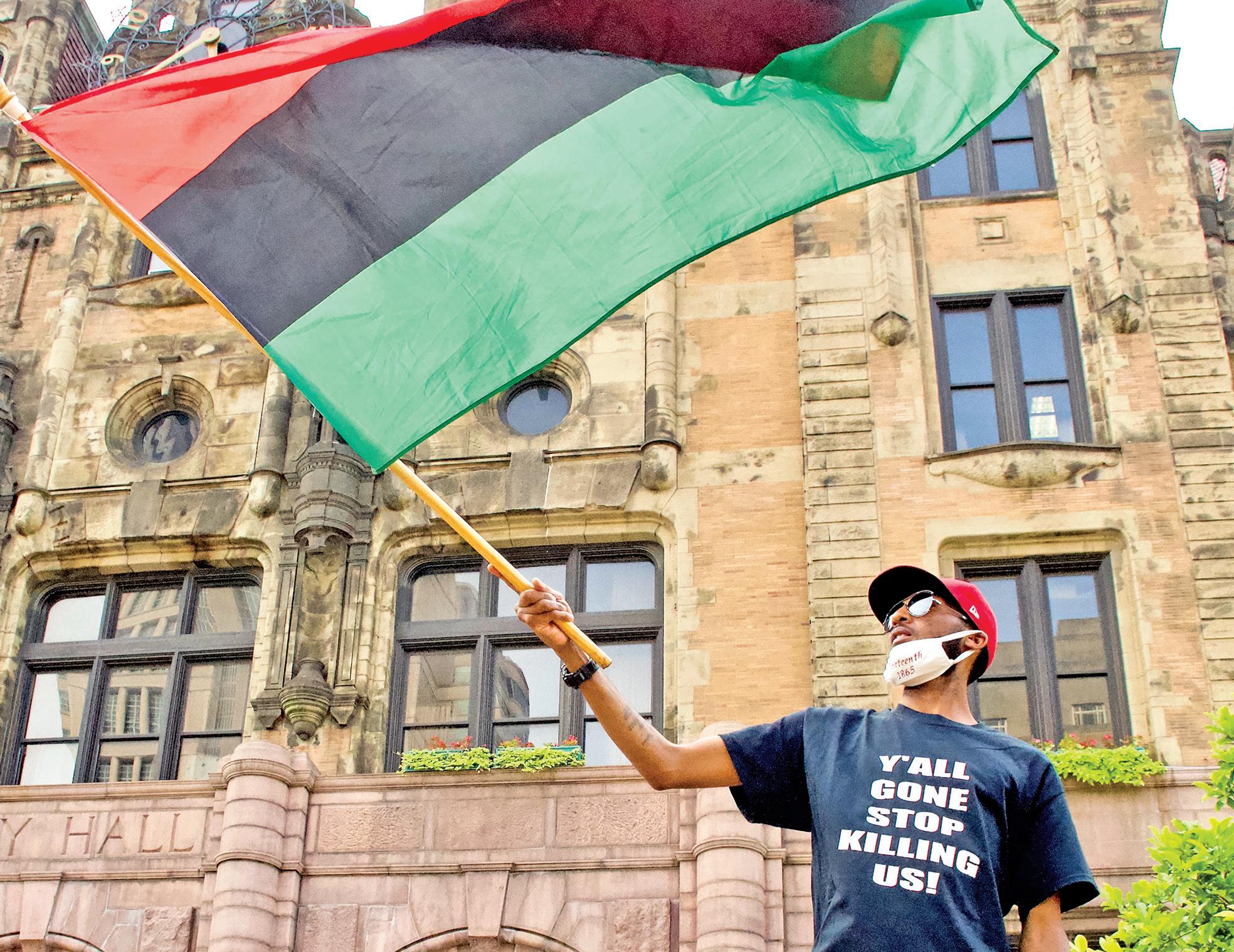
her Black girl joy visible for all to see. In a black T-shirt that read “Y’all Gone Stop Killing Us,” Ashe participated in a stroll with her Delta Sigma Theta sorority sisters that tied in their
signature steps with the dance combinations of The Wobble.
Smiling from ear to ear, she flexed for her sorors – pressing her thumb and index fingers together to create the two-hand triangle that represents for
Delta.
“I gotta enjoy the moment with my people – this is just a moment for us,” Ashe said.
“Black people, I need you to enjoy today – you deserve to enjoy today.”
Many members of the cohort group at St. John’s moved on to the South Side to party. On the street adjacent to Blank Space on Cherokee Street, the group danced and partied in the name of their
ancestors almost until the sun went down. A group Electric Slide and liberation music from the likes of Bob Marley and others expressed the mood of the gathering.
“Africa unite,” a man sang at the top of his voice in a concerted effort to match the decibels of Marley’s voice as it blasted through the speakers. “Get into the Juneteenth vibe,” a woman said to her friend as she grooved to the music while observing the handful of vendors set up on Nebraska Street.
In University City, the Juneteenth event was more serious in tone. Speakers said that police brutality against African Americans is but a symptom of systemic racism.
“Our memories are long,” Simmons said. “We’ve known moments of profound victories – and also moments of grave loss. There is honor in remembering and not allowing this nation to forget its debt to Black people.” He was quoting a passage from an open letter from Movement For Black Lives National Field Director Karissa Lewis to Black people that appeared on ESSENCE.com in commemoration of Juneteenth.
“Today, on this 155th anniversary of that first Juneteenth, we celebrate our resilience, our unrelenting dedication to Black people, to our own freedom and to each and every victory in the face of constant violence,” Simmons said, quoting Lewis. “Our memory is long, but we will always remember and honor our ancestors.”
“When I was a pastor, you could even ask the children and they would know what was going on in the church,” Jones said.
The new mayor said in 90 days she would host her first town hall meeting to update the public on what she had done and planned to do. She said Ferguson needs and was going to get transparency.
The current police chief of Ferguson, Chief Jason
P. Armstrong, attended but watched the ceremony quietly from under a shade tree. The Ferguson Police, which brought this small town to the attention of the world, was not an issue. The department and the city currently are being monitored for compliance with a federal consent

decree. When Jones said, “In Ferguson, we practice constitutional policing,” one woman said, “We do!” There was no further comment.
The Urban League of Metropolitan St. Louis built out the Ferguson Empowerment Center on the site of the QuikTrip that was torched on
August 10, 2014. It was the brainchild of President and CEO Michael P. McMillan, who hosted the swearing in ceremony after providing Jones’ campaign with a safe space.
“This is the future of the City of Ferguson,” McMillan said. “Thank you to those who voted for her and gave us the opportunity to be here. It is your challenge to let this not be the end of your time with her. The city needs your help. It needs your time, talent and treasure. These are historic times.”



The Eta Boule Foundation donated $100,000 to the Urban League on Saturday, June 20 at the Urban League’s most recent mass distribution of food and necessities in North St. Louis. The foundation is the charitable arm of the Eta Boule Chapter of Sigma Pi Phi Fraternity.
By Maureen Brinkley For The St. Louis American

write this piece, the biggest challenges facing small businesses were the devastating impact of the new coronavirus and the shutdown and social-distancing requirements it imposed on small businesses. And then on May 25 the entire nation watched one of the most horrifying and heartbreaking events unfold before our eyes. When I heard George Floyd crying out, “I can’t breathe,” as a mother of young black men I nearly stopped breathing. Dr. Martin Luther King Jr. referred to riots as the “language of the unheard.” Having witnessed yet another example of systemic racism and injustice, communities across the nation erupted in exactly that language as a wave of outrage led to rioting and looting. Our region was not spared, and small businesses in Ferguson and St. Louis were damaged and, in some cases, destroyed. When the new coronavirus outbreak hit, we were all thrust into unchartered waters with health concerns and dramatic changes to our routines. Suddenly small business owners faced the biggest hardship in the life of their business – unplanned disruption of their operation and livelihood. The tragic events surrounding George Floyd’s death added a new
By Chris King
Of The St. Louis American
When the men of the Eta Boule Chapter of Sigma Pi Phi Fraternity decided to make a significant donation to the Urban League of Metropolitan St. Louis to support its ongoing COVID-19 relief efforts, it was no act of distant charity. It was an act of fellowship in a crisis to help people close to them.
“With all this food scarcity, we all have friends and families in the middle of this,” said Christopher Terry, chairman of the Eta Boule Foundation.
n “The personal generosity of every single member of the fraternity is overwhelming at this very significant time of need.”
– Michael P. McMillan, Urban League of Metropolitan St. Louis
The Eta Boule Foundation donated $100,000 to the Urban League on Saturday, June 20 at the Urban League’s most recent mass distribution of food and necessities in North St. Louis. The chapter has 72 members, and all of them contributed to the foundation to support this donation, according to Dr. Richard White, sire archon for the chapter.
Many of the archons gathered at the Urban League service event behind the Victor Roberts Building on North Kingshighway Boulevard to help distribute the food and necessities.
“We see an immediate need for this campaign,” White said. “Our
community is drastically effected by this incredible catastrophe.”
The fundraising effort began several years ago with a benefit concert at the Sheldon, which was timed around Father’s Day. This year, a concert was not possible because of the pandemic, so archons made personal contributions to reach the $100,000 goal.
“This was a sacrifice on the part of our archons,” White said. “Our archons are affected by this as much as anyone in the community. We all made sacrifices to support our brothers and sisters in the community.”
The Urban League was an “easy” choice of beneficiary, Terry said, because of its unquestioned leadership in supporting the community throughout the COVID-19 crisis with massive weekly food service events. It did not hurt that Michael P. McMillan, president and CEO of the Urban League of Metropolitan St. Louis, is an archon.
“The Urban League is truly grateful to the Eta Boule for this historic contribution,” McMillan said. “The personal generosity of every single member of the fraternity is overwhelming at this very significant time of

n “This building will allow us to get more dads involved,” founder and CEO Halbert Sullivan said of Fathers & Families Support Center’s new headquarters.
will help them gain jobs paying around $50,000.
“This building will allow us to get more dads involved,” Sullivan said.
In an online broadcast of the Toast to Fathers annual dinner and fundraiser, Sullivan said that while nationally 1 out of every 4 children live in single-parent homes, children in brown and black communities are disproportionately affected. He said that 42% of Hispanic and 67% of African-American children live in single-parent households.
Sullivan said that Fathers & Families Support Center has a nationally-recognized model called the Family Formation Program that gives fathers the tools and support they need to become responsible and involved parents. He said that the program has helped fathers reach a 62% job placement rate and that 75% of program participants provide financial support to their children and 80% have regular interactions with their children.
Demetrice Davis was named the Fathers & Families Support Center

Continued from A9
2020 Father of the Year. The 32-year-old father of two daughters originally came to the center for legal support to gain visitation rights to see one of his daughters. He said he was not only able to improve his parenting skills but was also able to get the support he needed to gain joint custody of his children.
n To help Fathers & Families Support Center reach its goal: text your name and pledge amount to 314-5703371 or visit www.fatherssupportcenter.org.
Sullivan said Fathers & Families Support Center has two-full time legal staff to help fathers protect their parental rights.
“We’re connecting St. Louis-area fathers and their families so they can take their rightful place in the lives of their children,” Sullivan said.
To help Fathers & Families Support Center reach its goal: text your name and pledge amount to 314-570-3371, mail your check to 1601 Olive St., St. Louis MO 63103; or visit www.fatherssupportcenter.org to make a donation online.
Continued from A9
level of uncertainty and fear to that hardship.
My job is to let you know the Small Business Administration (SBA) is here to help you survive, rise from the ashes, and thrive. And, more importantly, it is here to help you realize this is just a chapter in your book, it is not the story. We will grow

The Missouri School Boards’ Association named Michelle Obama Early Childhood Academic Center the 2020 FutureBuilders’ Foundation Early Childhood Education Program of the Year in the large school district category. The center is an innovative early childhood program in Riverview Gardens School District that serves approximately 245 students. “Fostering an environment that fuels the creativity and curiosity of our students is a team effort,” said Lanor Payne, director of the center.
through this together. Many small business owners resourcefully adapted. Others have chosen to wait to restart their business. Some need more assistance now than ever. The focus for many now shifts to recovery, with the reopening of the economy and lifting of social-distancing restrictions. Although I am not a small business owner myself, I have over 52 years of experience working with entrepreneurs and, based on these experiences, I share what I see as the
n When I heard George Floyd crying out, “I can’t breathe,” as a mother of young black men I nearly stopped breathing.
strongholds of our St. Louis small business community and the reason you will succeed.
First, you come from a culture of service before self. You have been instilled with a focus of fulfilling goals and dreams.
Second, you have been trained to think strategically,

act deliberately and perform when others say it can’t be done. If the task is to deliver that product on time, “no” is not an option. You will find a way. Third, you have support from fellow entrepreneurs and small businesses in our communities. You know that trust is not just words spoken, but deeds in action. And you do not take that for granted. Fourth, you have respect and honor for what you represent, and you will do whatever it takes to keep that core intact.
Continued from A9
Currently, the local Urban
Continued from A9 need. We will continue to partner to help those most in need throughout the region.”
were increased by 50% and strategic partnerships with 10 historically black colleges and universities were developed as a graduate school pipeline. He also taught undergraduate courses in diversity and United States history.
Gipson also developed curricula for My Brothers’ Keeper Presidential initiative that reached more than 100,000 minority young men and planned and implemented
Finally, you all know someone in your small business community whose business did not make it through the storm. In contrast, there are many who have overcome challenges and who, as business owners, show a steely resolve that those who have never experienced adversity cannot fathom or comprehend. It is an indomitable spirit that says, “You can put me down, but you cannot take me out.”
When you match this kind of heart and drive with an entrepreneurial spirit, you cannot do anything but succeed. It may not be today or tomorrow, but if you stay the course, it will happen.
My very personal guide throughout my life is and has
League is working to shift its massive relief efforts to the neighborhood level through churches and the Federation of Block Units. It will have a partner in Eta Boule as its relief model evolves, because the engagement will be ongoing.
“We know this is not going
n During his tenure at Arkansas State, Gipson planned and implemented the first Black Student Athlete Conference.
the first Black Student Athlete Conference.
“Gipson’s extensive experience working collaboratively with administrators, faculty, staff, students, alumni and community members make him

The CEO of Netflix said he will donate $120 million to historically black colleges and universities (HBCUs) on June 17.
Reed Hastings, the CEO of Netflix, and his wife Patty Quillin, said they are donating $40 million to Morehouse College, $40 million to Spelman College, and $40 million to the United Negro College Fund (UNCF).
“We’ve supported these three extraordinary institutions for the last few years because we believe that investing in the education of Black youth is one of the best ways to invest in America’s future,” Hastings and Quillin said in a statement. The two said HBCUs “have a tremendous record, yet are disadvantaged when it comes to giving.”
“Generally, white capital flows to predominantly white institutions, perpetuating capital isolation,” they said. “We hope this additional $120 million donation will help more black students follow their dreams.”
They called on others to also support these institutions to help “reverse generations of inequity in our country.”
been from Scripture. “‘For I know the plans I have for you,’ declares the Lord, ‘plans to prosper you and not to harm you, plans to give you hope and a future.’” You have a support system in the SBA, where our message is clear. From our Administrator Jovita Carranza to our program offices in Washington, D.C. to our district offices in the field, we are committed to that end. The SBA offers a variety of support and resources for your small business, including a vast network of resource partners ready to help you strategize your business rebound. They are all listed at www.sba.gov.
Maureen Brinkley is district director of SBA St. Louis.
away,” Terry said. “The foundation is going to be there. We are determining what to do next and how to stay involved. It’s going to be a long haul. We want to help the Urban League do even more in the community.”
uniquely qualified to continue the important work of inclusion, diversity and equity at Mizzou,” MU System President and University of Missouri Interim Chancellor Mun Choi stated.
Since 2017, the graduation rate among African-American students at MU has risen from 51.9% to 58.4%, and the graduation rate for Hispanic students has risen from 63.5% to 66.5%, according to the university. Also, MU reports that underrepresented faculty – including African-American and Hispanic – have grown by 32% since 2015, from 140 to 185 faculty members.
“This is a place where I can go and be a part of a team that is already doing hard work and is focused on doing it right,” Gipson stated.
Gipson is expected to receive a doctoral degree in history from the University of Mississippi in December and holds a juris doctor from Southern University Law Center in Baton Rouge, as well as a master’s degree in history from Missouri State University and a bachelor’s degree in interdisciplinary studies from Louisiana State University. Gipson starts his new position July 15, but will participate in some university activities prior to that date. NaTashua Davis, who has served as interim vice chancellor for IDE since July 2019, will return to her position as executive director of MU’s Access & Leadership Development Unit.
March 10, 1928 – June 20, 2020
Namesake of the Harold and Dorothy Steward Center for Jazz
By the Steward family
For The St. Louis American
“The creator gets to define his creation,” and so He did with Dr. Dorothy Elizabeth Massingale Steward. After 92 incredible years on this earth, our precious mother, grandmother and great-grandmother was called home to glory on June 20, 2020.
Dorothy was born March 10, 1928, the only child of James Frederick and Martha Ann Wilson Massingale. At the early age of seven, Dorothy was moved by the Holy Spirit and decided to follow Christ. She joined St. James Church where the family worshipped. As a young girl, Dorothy attended Lincoln School in Clinton, Missouri. She was a bright, precocious student and skipped two grades. Later, to further her education during a time of segregated schools, the family moved to Chicago, Illinois, where she graduated from Wendell Phillips High School a year early. She loved music and attended advanced college studies in Chicago.
On February 17, 1946, Dorothy was united in holy matrimony to the love of her life, Harold Lloyd Steward, a union that lasted until his death in 1999. The couple later moved their family back to Clinton, Missouri. She was a devoted wife and living example of the Proverbs 31 woman, bringing honor to the family. From this union “The Great Eight Plus” and their progeny were born (reflected below as
Dorothy’s children; grandchildren; great-grandchildren): James Philip (Shirley) Steward; grandchildren Mark Anthony (deceased), James Tracey, Philip II (Dianne), Paige (Dedrick) Franklin, Zachary: great-grandsons Isaiah, Dylan Regina Ann (Ivan) Brame; granddaughter Courtney Joan Marie Newbill; grandson Perry Jr. (Tagen); great-grandson PerryJames Yvonne (Johnny) Williams; grandchildren Reginald (Sheila) Miles, Dwight (Nia) Williams, Keith Fishback, Lauren Brianne Fishback; great-grandchildren Ashley (Cyril) Crenshaw, Jacine, Sheila Wilkes, Dante and Danisha Littlejohn, Ivan Williams, Jason Williams II, Axl Williams, Rosalyn Fishback, Aris Kelly; greatgreat-grandson Cyril II David Lloyd (Thelma) Steward; grandchildren David II (Mary) Steward and Kimberly Steward; great-grandsons David III and Julian Michael Leonard (Cheryle) Steward; grandchildren Michael Alexander (deceased), Nicole Carter, Dominique; great-grandchildren Jamie McClure, Amari Carter, Walter Carter III, Cavaan Toney; great-greatgrandson Princeton Hancock Martha Ann (Lewis) Hurtt; grandchildren Justin, Victoria and Daniel Hurtt Robert Eric (Lesa) Steward; grandchildren Terry, Morgan, and Jordan; great-grandson Kaydin BurnettSteward.
Dorothy’s greatest love was God, her husband, and their eight kids in that order. There
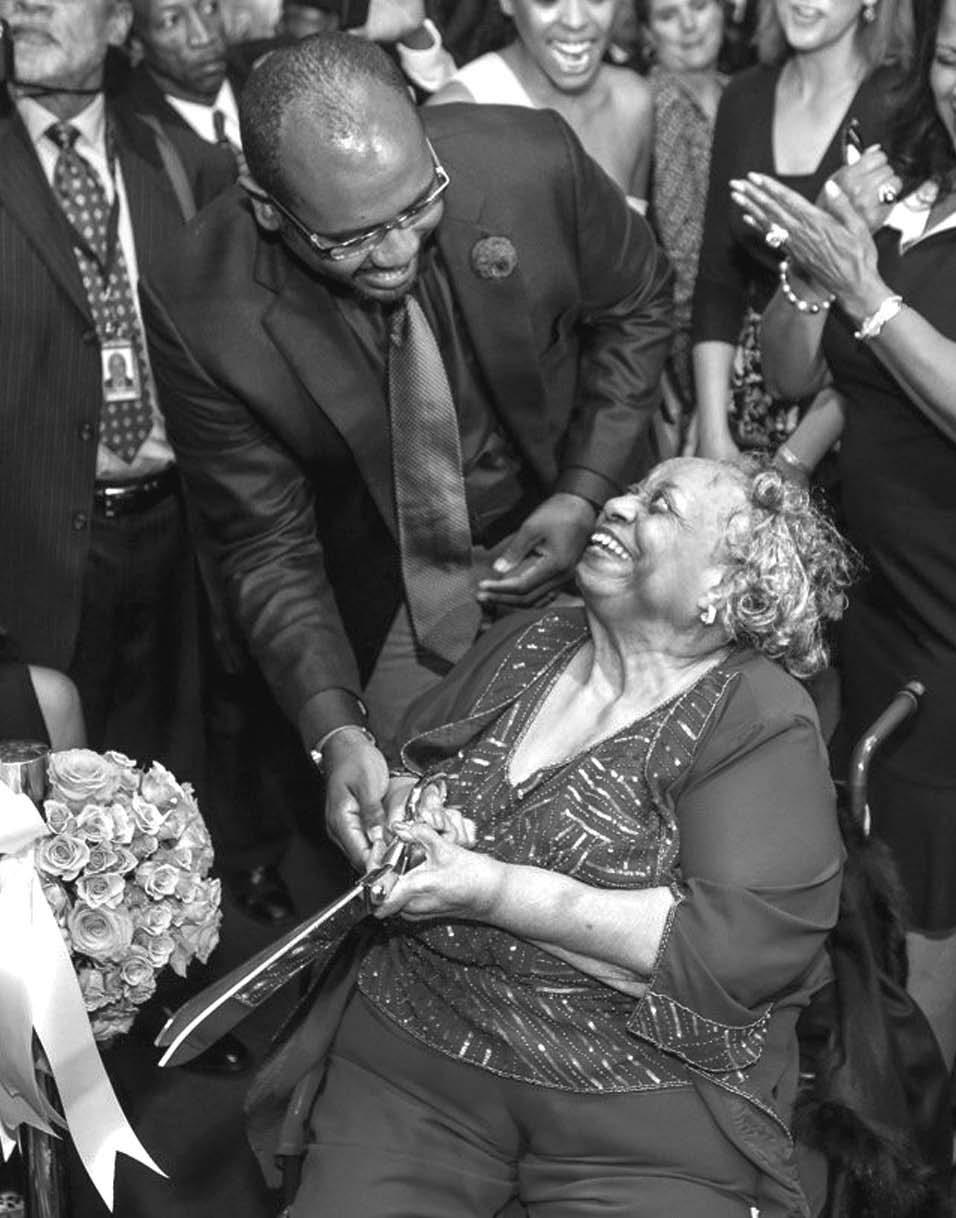
was not a task too small or too large when it came to caring for her family. She was a hands-on mother and actively engaged with all of her children, individually and as a whole. She taught her kids games from jump rope to baseball and merrily played alongside them. She made every single one of her children feel like they were an only child when in her presence. At the request of the youngest child, the annual family picnic was born after he voiced missing his siblings. Dorothy was willing to do anything to mend her children’s hearts and called everyone home for a summer family gathering. It became an annual Steward family tradi-
tion that has spanned decades as God continued to define His creation.
Dorothy worked as a housekeeper and later as a typesetter and layout designer for the Clinton Daily Democrat. Dorothy was a longstanding pillar in the Black community of Clinton and built many longstanding relationships that spanned decades. She served faithfully on many religious and civic boards, including Grand Matron of the Order of Eastern Star, founding member of the Samaritan Center Development Board and ultimately served on the Henry Country Library Board of Directors, an institution which earlier in her life
David Steward II helped his grandmother Dr. Dorothy Steward cut the ribbon on the Harold and Dorothy Center for Jazz at the grand opening gala on October 2, 2014.
Photo by Lawrence Bryant
had denied her entry due to segregation. She founded and was the den mother to the first integrated Boy Scout Troop in Clinton, Missouri. She and a dedicated group taught Black history in the community for many years.
One of her most cherished accolades was the naming of the Harold and Dorothy Steward Center for Jazz in St. Louis, Missouri, an organization dedicated to preserving the art of jazz for future generations.
In recognition of her lifelong accomplishments and love for education and service, Dorothy was recently awarded a Doctorate of Humane Letters from Lincoln University, Jefferson City, Missouri, an Historically Black University she held in the highest esteem. Dorothy was musically gifted and taught and encouraged her kids to play music. She played piano and alto saxophone and lifted her sweet soprano voice in worship at St. James Church, Clinton United Methodist Church and numerous gatherings in the community. She continued to sing until she had no voice.
She ministered to millions of souls in her own special way, encouraging her children,
“You might be the only Bible they may see that day.” Most importantly, she was a devout and humble woman of God and taught her kids to love Him and all of His children unconditionally.
Dorothy painted a masterpiece with her life, was truly a good “steward” of all God provided, and proof that while we all only have one life, if done right it is more than enough. In all that she did during her abundant life, she honored God and the countless sacrifices made by those who came before her. Dorothy’s vast and rich legacy will live forever in the hearts of her children, grandchildren, great-grandchildren, great-great-grandchildren and those who love the Lord. She will be dearly missed by countless friends and family.
Prayers and notes of condolences to the family are welcome. The family respectfully requests no flowers. For those who wish, memorials may be made to Clinton United Methodist Church or the Harold and Dorothy Steward Center for Jazz.
A private funeral will be held at Clinton United Methodist Church for immediate family on Thursday, June 25, followed by a private graveside committal service at Antioch Cemetery. To celebrate Dorothy’s love for jazz, the Bosman Twins will play at the Pavilion in Clinton’s Downtown Square at 12 p.m. on Thursday, June 25. The community is welcome to join the funeral procession departing Clinton United Methodist Church at 12 p.m. or gather along the procession route at the Downtown Square or along 4th Street near East College Street to send God’s cherished daughter Dorothy home to her reward.

If you could do one thing for your community, what would it be? More daycare centers? More funding for Head Start? Completing the 2020 Census is a safe and easy way to inform how billions of dollars in funding flow into your community for hundreds of services. Respond online, by phone, or by mail.
Complete the census at:
It turns out that sparks can fly at a candidate forum conducted over Zoom, even when conducted by clergy who declare to the candidates that they “will not tolerate character attacks” or “any messiness in this forum.” That was the warning given by the Rev. Darryl Gray, political advisor to the St. Louis Metropolitan Clergy Coalition, who moderated the forum on Thursday, June 18.
The most sparks flew between St. Louis Circuit Attorney Kimberly Gardner and Mary Pat Carl, her challenger in the August 4 Democratic primary. Carl prosecuted cases in the office for many years, mostly under Jennifer Joyce Gardner came out swinging – not against her challenger but against the St. Louis Post-Dispatch, which has published a jeremiad of critical news reports and editorials at Gardner’s expense. Though Carl’s opening statement was a positive statement of personal resilience, she soon followed with criticisms of Gardner covered in Post reporting and editorials: namely, that Gardner has failed to retain staff, take cases from the police and prosecute cases successfully.
Gardner responded that change agents tend to lose status quo staff, who “go onto better, more high-paying jobs like Mary Pat.” Gardner cited a surprising statistic – that “less than 4%” of a prosecutor’s work is spent in trials; securing pleas and seeking alternative resolutions form most of the work. She claimed her office has “a 97% felony conviction rate” for those cases it does try. Gardner tried to associate Carl with Jeff Roorda controversial business agent of the St. Louis Police Officers Association (POA). Carl responded by pointing out that Gardner served alongside and co-sponsored bills with Roorda in the Missouri House of Representatives. More recently, Roorda and Gardner have clashed; Gardner named Roorda in a suit she filed using the Ku Klux Klan Act. However, Roorda told The American that the POA has not endorsed in the race.
The St. Louis County executive forum also drew some heat, though only from one source. Jake Zimmerman, one of three candidates challenging incumbent Dr. Sam Page in the August
4 Democratic primary, directed nearly every one of his statements at Page as an attack on the subject of race.
Zimmerman blamed Page for the county being slow to provide COVID-19 test sites in North County, where the majority of cases have clustered, and for grooming a police board that hired a police chief, Mary Barton, who claimed there is no racism in the St. Louis County Police Department. Zimmerman also touted his endorsement by the Fannie Lou Hamer Coalition of black elected officials in the county. Page said he is “disappointed there is so much negative campaigning” without directly answering Zimmerman’s attacks. Page did assert that “equity is the bedrock” of his administration and pointed out that he had appointed Jason Purnell, lead author of the landmark “For the Sake of All” 2014 report on racial disparities in St. Louis, to advise on the county’s COVID-19 response. And Page said that he had “asked the police chief to review” all department policies in light of the recent highprofile killings of black people by police officers. Mark Mantovani, who also is challenging Page, kept a low temperature while arguing that his proven abilities as a business leader are what the county needs. “If we don’t create economic growth,” he said, “we won’t have the resources” needed to make change. He also positioned himself as a centrist who can convene “a big tent of engaged citizens.” Zimmerman’s attempt to slam Page as status quo on police reform was diminished by Mantovani talking about his police union endorsement. “I don’t want to fight with cops,” Mantovani said, “but I did ask them one thing: be open to change.”
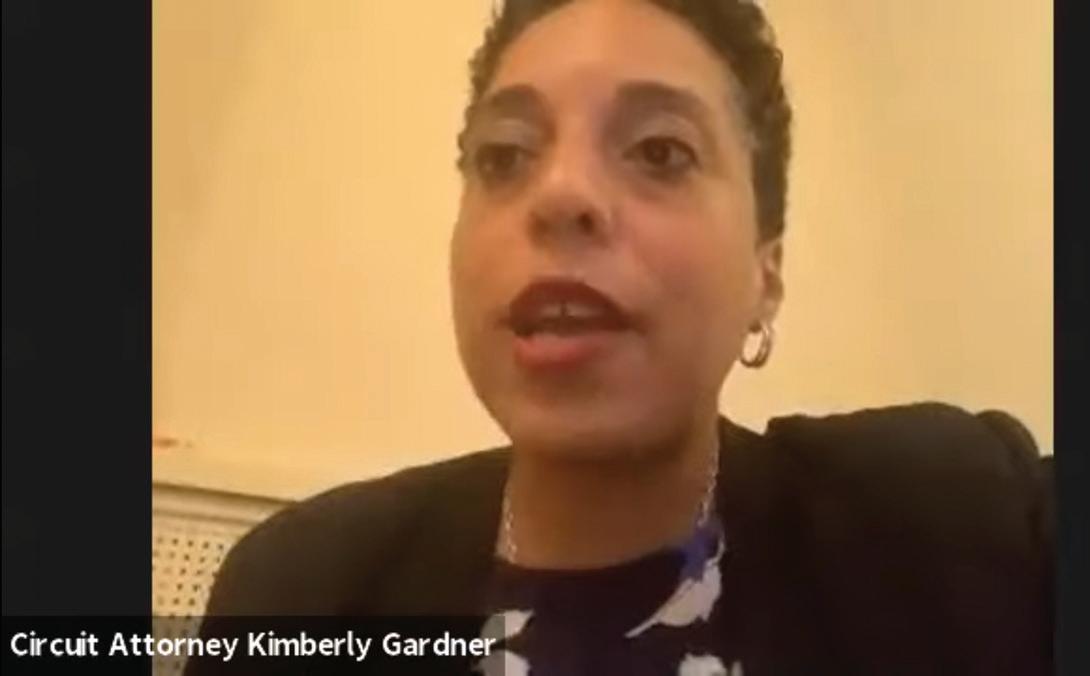
Boyd sounded familiar themes – mainly, that the treasurer should relinquish its City Charter-established control of the Parking Division and parking revenues, letting the city accrue those revenues in its general fund.
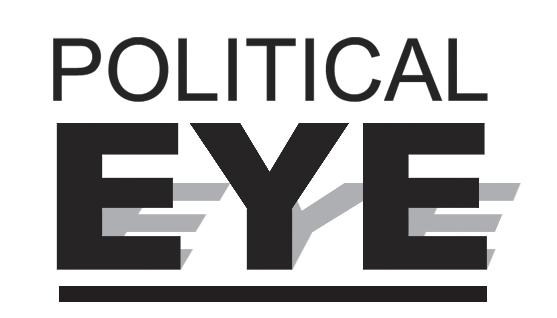
Jones focused on what she has been able to achieve with the office as the City Charter established it. She said she has improved and upgraded parking operations, increased staff wages and contributed more revenue to the city’s general revenue, while writing fewer tickets and investing $1.1 million in more than 16,000 child savings accounts in the city.
The three candidates to replace the term-limited Jamilah Nasheed as state senator in the 5th District presented completely different qualifications and offered no criticisms of one another.
Jamie Tolliver, who also filed for county executive as a Democrat, did not join the forum.
The Democratic primary for St. Louis treasurer featured two familiar adversaries, incumbent Treasurer Tishaura O. Jones and Alderman Jeffrey Boyd Jones has defeated Boyd twice at the polls, once for treasurer and once for mayor (in an election they both lost to Mayor Lyda Krewson).
Alderwoman Megan Ellyia Green presented herself as a progressive who has been active on the ground from the beginning on fights to raise the minimum wage and close the Workhouse, as well as protecting the abortion option and supporting victims of sexual assault. “I have stood on the front lines with social movements,” Green said, “and I have never taken an endorsement or check from the POA. I am not

their friend, and that’s a good thing in this environment.”
State Rep. Steven Roberts presented himself as the candidate who already is in the thick of the fight in the Missouri Legislature as chair of the Black Caucus and one of the most effective Democrats in moving legislation (mostly, as amendments) under Republican control. His degree of awareness of the current status of progressive policy initiatives – on criminal justice reform, voting access, antipoverty programs – in the Legislature was impressive for its minuteness of detail. However, he was the only candidate for the seat who did not oppose airport privatization. “It depends,” he said. This initiative may be coming to a city ballot soon, as advocates for leasing the airport
said they delivered more than 38,000 signatures on Monday, June 22. Registered lobbyists for the effort include longtime former Mayor Francis G. Slay ally Louis Hamilton and police union representative Jane Dueker. Dueker’s role makes sense, given the proposal guarantees the police 30% of proceeds from an airport lease and a minimum $300 million. Apparently, the St. Louis Chapter of the NAACP, which is pushing the proposal, did not get the Defund the Police memo. Michelle Sherod spoke more about her high-profile endorsements – Nasheed and former U.S. Senator Claire McCaskill, whose St. Louis regional office Sherod ran –than her relevant qualifications or policy proposals. She was the only candidate for the
seat who opposed closing the Workhouse. “It’s an easy phrase,” she said, “but we have to understand why it exists. We need a facility to house those individuals to keep the streets safe. To close it without a plan in place is premature.” Sherod has been trying to deny and walk back this statement ever since she was videotaped saying it.
The Clergy Coalition also provided a forum for the two candidates for St. Louis sheriff, Alfred Montgomery and the incumbent, Vernon Betts Montgomery presented himself as a millennial, former deputy sheriff and former police officer who would improve professional certification, “eliminate patronage hiring” and restore “transparency and integrity” to the office. Betts did not defend himself against the implicit claims that he lacks transparency and integrity and practices patronage hiring. He pointed out that he is working to improve professional certification in the office, that no one was injured during Stockley verdict protests in the buildings guarded by his deputies, and that he had raised staff wages. “All my guys are working secondary jobs,” Betts said. “They work like Hebrew slaves.”
Bishop Elijah Hankerson president of the clergy coalition, presided over the forum and introduced it. “We are in the second wave of the Civil Rights Movement,” Hankerson said, while also dealing with a pandemic, the U.S. Census and violent crime.
“We do not endorse, but we do inform,” Hankerson said. “You need to register to vote.” The last date to register for the August 4 primary is July 8.

$100,000 to
In an effort to help the devastating impact of COVID-19 on some of St. Louis most vulnerable communities, the members of The Eta Boulé Chapter of Sigma Pi Phi Fraternity, Inc. recently donated $100,000 to the Urban League of Metropolitan St. Louis in support of its weekly Food, Toiletries & PPE Distributions. Over the past three months, the Urban League has distributed food, toiletries, light bulbs, and personal protective equipment to over 33,500 families in St. Louis City, St. Louis County, Madison, and St. Clair County, Illinois totaling more than $1.7 million in items. Dr. Richard B. White stated, “The underlying disparities African Americans already endure have made this pandemic even more devastating to our people. Guided by our mission to support the community overall, with the focus on black families and young black males, we knew it was essential that we take immediate action to render urgently needed community assistance.”
Under the direction of the Sire Archon, Dr. Richard B. White, and the Eta Boulé Foundation Chair-Archon, Christopher Terry, members of Eta Boulé unanimously voted to create the Eta Boulé COVID-19 Community Support Fund. At this time of economic uncertainty, Eta Boulé nevertheless raised $100,000 with 100% member participation. The funds have gone to support the Urban League’s Food & Toiletries Giveaways, a program that has been a lifeline to tens of thousands of families during the pandemic.
“The global pandemic is driving societal priorities by highlighting the awareness of economic and social disparities in our African American communities where we work and live. Today, the top priority for the Eta Boulé Foundation is to quickly support the Urban League of Metropolitan St. Louis in their efforts,” according to Chairman Christopher Terry.
“We are grateful to the Eta Boulé for their generous and historic gift to the Urban League. Their donations will impact thousands of families who are now struggling during this global pandemic,” said Michael P. McMillan, President & CEO of the Urban League of Metropolitan St. Louis, Inc. For more information, please visit www.ULSTL.com.
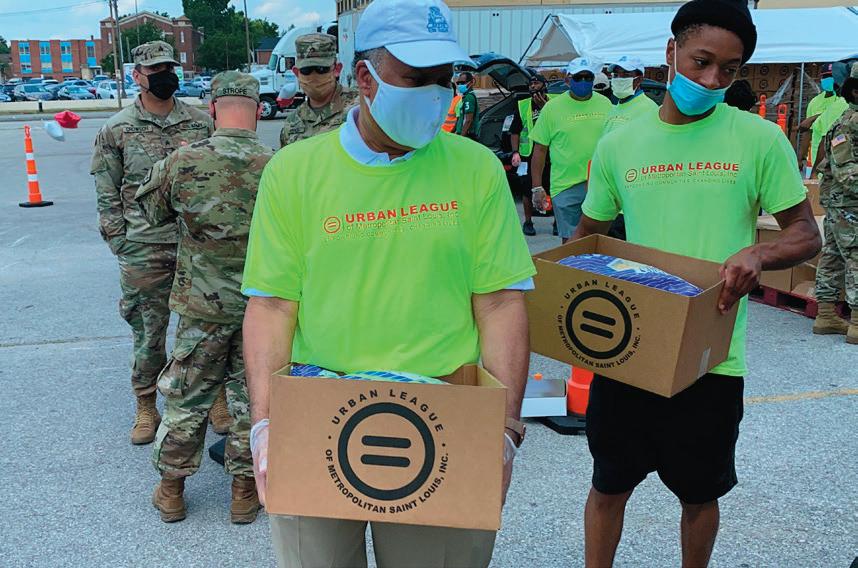

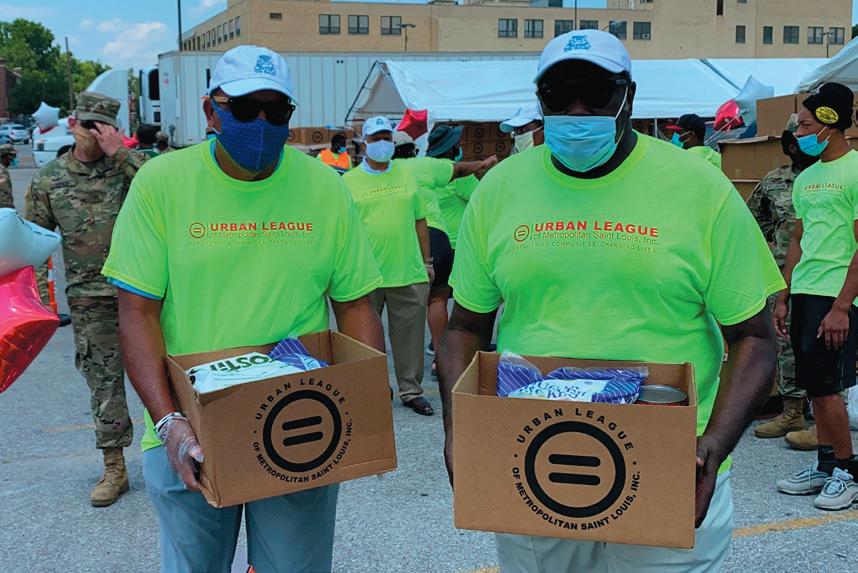

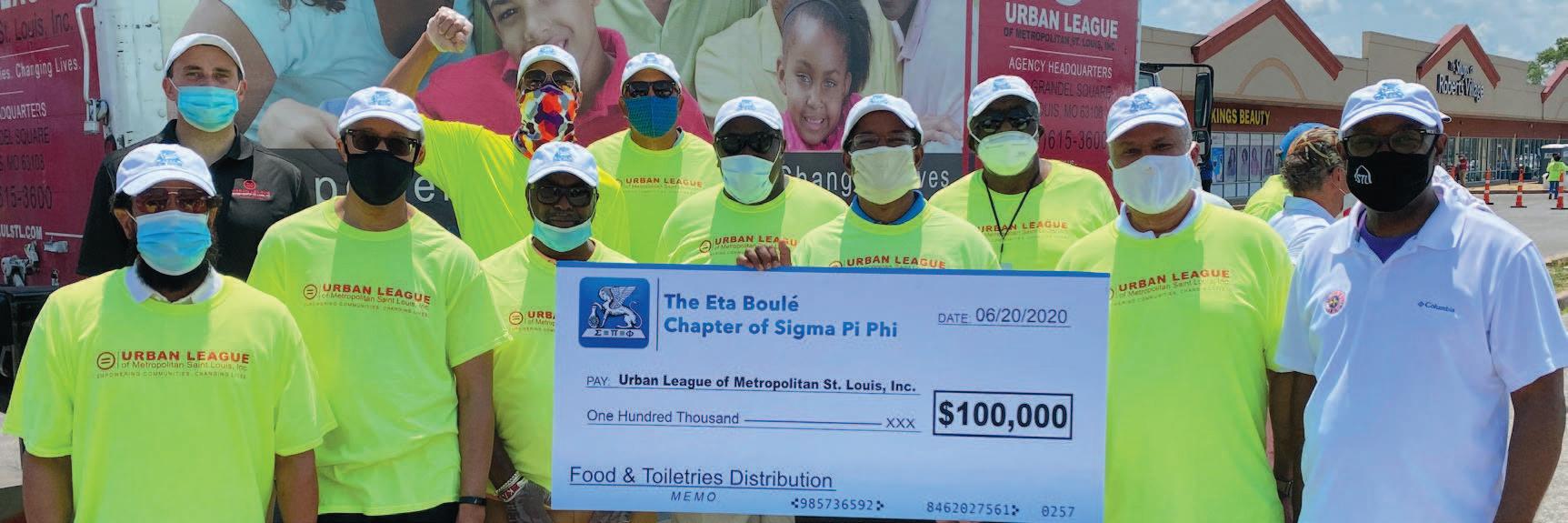





‘There
By Chris King Of The St.
Louis
American
When Dr. Fredrick Echols, the acting health director for the City of St. Louis, reported via The St. Louis American that the first 12 victims of the COVID-19 pandemic in the city were all African Americans, he recognized the obvious tragedy. Our health care systems are failing along racial lines. But he also recognized an opportunity, and he and his small staff of public health professionals are acting upon it. They are doing so by following leads that emerge from contact tracing. Contact tracing is a basic tool of pandemic response. Disease investigators interview people who have tested
n “How do we keep organizations engaged to prioritize the most vulnerable and not go back to the status quo of treating those who have and forgetting about everybody else?”
– Dr. Fredrick Echols
positive for an infectious disease and ask them whom they have come into contact with during their infectious period; the
Missouri Foundation for Health funds phase two of PrepareSTL
American staff
The St. Louis Regional Health Commission (RHC) has been awarded a $1 million grant from Missouri Foundation for Health for the second phase of the PrepareSTL campaign. In its first phase, Prepare STL provided information and resources to people disproportionately impacted by COVID-19 –low-to-moderate income African Americans and people of color living in St. Louis city and county – to slow the spread of the new coronavirus and address its adverse social and economic impacts.
In Prepare STL, RHC works in partnership with the City of St. Louis Department of Health, the St. Louis County Department of Public Health, St. Louis Integrated Health Network, Alive and Well Communities, St. Louis Mental Health Board (MHB), Vector Communications and Emerging Wisdom.

n Bethany Johnson-Javois, CEO of St. Louis Integrated Health Network, said that PrepareSTL is “addressing systemic intergenerational trauma while working amidst public health crises.” Get tested for
“Black women have played a major role in developing and implementing this cam-
By Mellve Shahid Sr.
For The St. Louis American
Over the past 13 years of being a prostate cancer survivor and health advocate for prostate cancer awareness, I’ve seen several epidemics – prostate cancer, poverty, economic stress, black on black crime, the coronavirus, social and institutional injustices – impact the health and safety of cancer survivors. Urban epidemics are pandemics in AfricanAmerican communities.
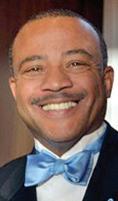
Mellve Shahid Sr.
COVID-19 has put a halt on my making faceto-face contact with many of my prostate cancer survivors, a brotherhood that I love so dearly. It has temporarily closed the doors of our Cancer Center and shut down our monthly in-person support group meetings. I miss seeing and hugging my sweet angels, the elderly ladies at the Metropolitan Village Apartments, who work so closely to help us host the support group meetings.
n COVID-19 has put a halt on my making face-to-face contact with many of my prostate cancer survivors, a brotherhood that I love so dearly.
Yes, a cease-and-desist order from this pandemic has shut down many of our programs, activities, and the projects we do every year to raise funds and awareness for our cause and organization. We are fostering new and creative ways of helping The Empowerment Network stay afloat as we continue to save lives from this disease. We’ve been forced to use social media and phone conferences as a means of staying connected in this time of uncertainty. We will not allow this pandemic to impact the mission that we’ve established.
As we watch the epidemics raging among men still being diagnosed with prostate cancer and as we see police brutality and violence on the rise in our community, it sickens me to my stomach to think that these epidemics are something that our younger generation
See COVID-19, A15
investigators then trace those contacts and test them for disease. Though the context is disturbing and potentially tragic – this is a process for telling people that they may have contracted an infectious and potentially fatal disease – the opportunity is unique. It provides public health professionals with a passport to contact the public and learn about public health. In a fragmented health care system that does not actually provide care for many people (more than a half-million people in Missouri lack health insurance, according to Timothy McBride of Washington University), there are See RHC, A15

A PrepareSTL canvasser gets his assignment as to where to impart public health information to residents.

By Sandra Jordan
Of The St. Louis American
Schnucks Markets contacted customers of their Cross Keys grocery store to inform then that it learned on Friday, June 19 that “a teammate who works at our Cross Keys store (located at 13987 New Halls Ferry Road in Florissant, Missouri) tested positive for COVID-19.”
That person last worked in the store on June 12 and began experiencing symptoms that
Continued from A14
paign, and we will continue to cultivate and celebrate the leadership of black women and all community leaders involved with the campaign,” said Angela Fleming Brown, CEO of the RHC.
During the first phase, PrepareSTL partnered with the T (a community trauma center founded by trauma surgeon and community activist Dr. LJ Punch) to assemble and distribute more than 50,000 personal protective equipment (PPE) kits. PrepareSTL organized nearly 200 volunteers to distribute the PPE kits and information to more than 1,000 public places across the city and county, focusing on black neighborhoods, immigrant communities and senior populations.
“PrepareSTL has created an incredible infrastructure for communications, community outreach, and economic development, which has all been rooted in racial and health equity,” said Courtney Stewart, vice president of Strategic Communications at Missouri Foundation for Health.
“We saw an opportunity to build on the outstanding work of our partners, and we didn’t want to lose momentum during a time when accurate, culturally focused information is cru-
Continued from A14
as many gaps in our health care knowledge as there are gaps in health care coverage.
“There is a human part to contact tracing,” Echols told The American. “When an individual tests positive, we get to engage with them, and in doing that we learn about other issues. For example, we are finding people who are HIVpositive but have had no care for 10 years – and reconnecting them to medical services.”
As the city’s 12 staff disease investigators trace and interview contacts with unmet health needs beyond the pandemic, they work with the Integrated Health Network, Regional Health Commission, health centers, hospital systems and the Urban League to identify resources that may be available but unknown to the uninsured individuals.
“We treat contacts and cases as people and look to find solu-
Continued from A14
will face if a solution is not found in our lifetime. I can see great similarities in all of them,
As

“TakingCareofYou”
The person last worked in the store on June 12
day. However, the company did not say where in the store the employee was stationed.
Schnucks described the measures being taken to protect employees and customers during the COVID-19 pandemic.
“Upon learning of the diagnosis, we scheduled our third-party vendor to disinfect the area where the teammate worked, in addition to common areas like the restroom, breakroom, etc., all in an effort to help make the store as safe as
n “Any teammate who has a fever or who says they have experienced any other COVID-19 symptoms is not allowed to work,” Schnucks stated.
possible,” Schnucks stated.
Schnucks Cross Keys store remains open, and the company is continuing to follow local, state and federal guidance.
“There is currently no evidence to support that the novel coronavirus can be transmitted to
humans through food or food packaging materials,” Schnucks stated.
Schnucks requires workers to wear company-provided face masks while they are working. It requests (but does not mandate) that shoppers
wear face coverings as well to help decrease the spread of COVID-19. The company also has plexiglass barriers installed at check-out lanes and service counters. Announcements about the importance of social distancing are made every 15 minutes, and workers are reminded hourly to clean hightouch surface areas.
“We are taking the temperatures of all of our teammates prior to allowing them to begin their shift, as well as asking them a series of questions
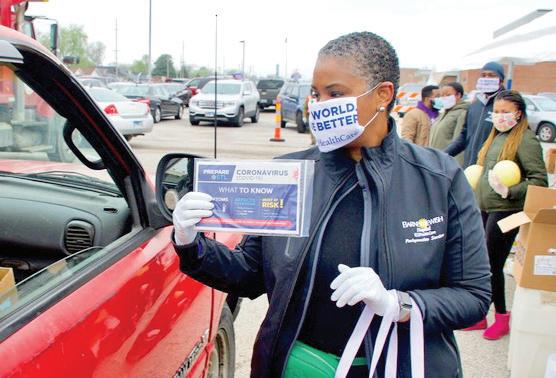
cial to those experiencing this pandemic and the challenges it presents for black and foreign-born St. Louisans in their communities.” Bethany Johnson-Javois,
tions to any gaps,” Echols said. Sometimes those gaps are immediately relevant to the immediate task at hand: slowing the spread of the new coronavirus. Fever is an indicator of contagion, so public health professionals direct the public to monitor their temperature. The virus’ membrane is destroyed by soap and alcohol-based sanitizers. So, when disease investigators interview COVID-19positive people without thermometers or hygiene supplies or the means to acquire them, they provide those supplies to help people get through the quarantine period without infecting others.
“We tell them to take their temperature twice a day, so what do we do when they say, ‘We don’t have thermometers?’” said Franda Thomas, communicable disease bureau chief for the city’s Health Department. “The city provides them.”
This invasive access to the public reveals many more unmet health needs and many more clues as to why African Americans are suffering and
and they all need to be eradicated. In my advocacy, I’ve said on many occasions: controlling the narrative of the awareness and educating the community about prostate cancer are keys to solving this public health
CEO of St. Louis Integrated Health Network, said that PrepareSTL is “addressing systemic intergenerational trauma while working amidst public health crises.”
dying from COVID-19 out of proportion to their population presence. As of June 18, 1,476 of the city’s 2,292 COVID-19 cases and 94 of the 144 deaths were of black people. That means 64.4% of the cases and 65.3% of the cases were of black people, when blacks form 45.9% of the city’s population.
“You hear a lot about ‘social determinants of health,’” Thomas said. “But we don’t hear about it. We come face-toface with it.”
Poverty is a major social determinant of health. Disease investigators in St. Louis come face-to-face with poverty every day. Thomas said most of the questions that investigators are asked relate more to poverty than to health or illness per se.
She said people ask: I don’t have a doctor; where can I go, and will I be charged? How can I be medically cleared if I have no health insurance? If I have to quarantine for 14 days, will you offer any assistance or compensation?
The loss of income and possibly employment from quarantine is a major obstacle
plague. As prostate cancer survivors, we are subjected to this pandemic and the epidemics daily. We must come out of our comfort zone, keep fighting by telling our stories and sharing our journeys with this disease.
“But the intensity over time without adequate supports and infrastructure will overtap and exhaust our community advocates, whose commitment and effectiveness are often tied to
for disease investigators. Not only does it pose problems in getting sick people to quarantine, it also hinders contact tracing. “When we ask for people an individual might have exposed,” Thomas said, “we’re often told, ‘I don’t want to be the reason why someone won’t go to work. I’m not giving you that information.’”
Though the public health orders to slow the spread of the virus are called “stay-at-home” orders, in fact the home is the most common place where infections are spread. This poses a particular problem for parents and especially single parents.
“If you are a parent and your child has to quarantine, that means you as parent have to quarantine,” Thomas said. “If you are a single parent with multiple children, how do you isolate as a primary caretaker? These are very real-life scenarios. Contact tracing is way more than collecting names.”
This fact makes social skills like the ability to build trust, establish networks and form connections essential to con-
We must use our voices in this climate of despair to encourage men to get tested for prostate cancer. We must also demand social justice, fairness and inclusion for all. As survivors, we are not exempt from the social ills and epidemics that
their direct experience of overcoming community traumas,” Johnson-Javois said.
“Caring for the sustained health and well-being of these front-line workers is a fun-
trolling this disease.
“Knowing how to trace contacts is a small piece,” Thomas said. “There is another side of it that you’re not going to get from a couple of training modules. You’ve got to know the local resources and make referrals. You’ve got to be able to make warm hand-offs. You’ve got to know the dedicated staff person who can help and make an extremely warm hand-off.”
Echols said the pandemic response is educating him and his staff in the specific needs that must be met if the region is going to address the health care disparities by race that everyone has known about at least since the 2013 publication of “For the Sake of All.”
“When we talk about disparities, it’s more than numbers,” Echols said. “It’s knowing the resources that are available and being able to connect people with resources. This involves building relationships, not only with individuals in need but also with organizations that provide essential services.”
regarding if they’ve experienced COVID-19 symptoms,” the company stated.
“Any teammate who has a fever or who says they have experienced any other COVID19 symptoms is not allowed to work. We are continuing to reinforce with our teammates, information shared by the CDC on COVID-19 prevention and symptoms, so that teammates are aware of what to look for and, most importantly, will stay home if they are feeling ill.”
damental component of this effort.”
Serena Muhammad, director of Strategic Initiatives for the Saint Louis MHB, said that through its outreach and engagement efforts, PrepareSTL is “creating a structure for people to heal together – healers for the healers.”
Rebeccah Bennett, founder and principal of Emerging Wisdom and InPower Institute, is the lead for PrepareSTL outreach efforts.
“While our PrepareSTL canvassers have public health information to impart to residents, they remain committed to observing, understanding, and responding to community needs,” Bennett said.
“Through meaningful community input and engagement, community residents will shape the communications strategy and action planning for PrepareSTL.”
Laurna Godwin, owner of Vector Communications, is the lead for PrepareSTL’s communications efforts.
“PrepareSTL demonstrates the importance of combining person-to-person strategies with advertising and media relations,” Godwin said, “because it often requires that people be exposed to a message multiple times and in different ways before they will take action.” For more information on PrepareSTL, visit PrepareSTL. com.
trouble our society. God has blessed this organization with a hard-working leadership team and some great minds to help us survive the pandemic and epidemics we now face. We are not going anywhere, and we are stronger
The question becomes: how can the health care system respond to the underlying social problems with the urgency of a crisis after the immediate health crisis subsides? This is not Echols’ first rodeo; it’s not his first outbreak of an infectious disease.
“We saw this with H1N1 and West Nile, too, when people were forced to seek medical services who do not typically engage with health care services. How do we keep them engaged?” Echols said.
“How do we keep organizations engaged to prioritize the most vulnerable after the situation is resolved and not go back to the status quo of treating those who have and forgetting about everybody else? That’s the system we’re trying not to repeat.”
Echols is seeing the inklings of future solutions in the midst of addressing an immediate crisis. “We’re used to talking about health disparities, but things don’t seem to change,” he said. “We are starting to ask what can we do to make a sustainable difference.”
than ever before. The road to success is always under construction. Mellve Shahid Sr. is a prostate cancer survivor and founder and president of The Empowerment Network.


By Yinka Faleti
For The St. Louis American
In 1991, I was the Brevard County, Florida, champion for ninth-grade boys in the onemile race.
I fell in love with running then and all over again a few years later as a plebe at West Point.
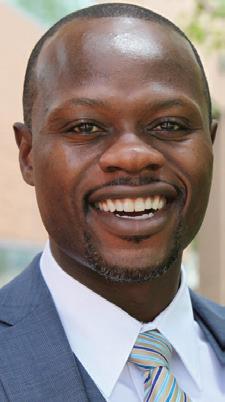
I had gone for a morning run the day I learned about the killing of Ahmaud Arbery. That’s reason number one his killing hit close to home. Reason number two: I’m an African American man. Prior to the pandemic, I ran once a week as part of a small group of three AfricanAmerican men. Part of the addictive beauty of running is that it’s good for the soul as well as the body. We would discuss everything on these runs— current events, politics, family, religion, popular culture, music, and art.
One of my running partners and I once had a conversation while stretching about running attire for black men. We agreed there are unspoken rules of running for black men. We had to make it very obvious that we were joggers and not criminals escaping the law, particularly since our runs were generally timed to begin at 6 a.m. when it’s often still dark outside. Whenever I buy running shoes, I gravitate toward bright and conspicuous pairs; I believe they help keep me safe. But my running partner took it a step further; he would go out of his way to warmly greet everyone he passed as we jogged by. That would keep him safe. We both felt we needed those safeguards. After all, we were running not many miles from where Michael Brown had once been walking. After Brown’s shooting death in Ferguson, thenGov. Jay Nixon (D-MO) empaneled a commission of 16 individuals. The commissioners worked for nearly a year and published an elegant, practical and actionable report. It is a road map for not just the St. Louis region, but for our entire country. My hope is that the commission’s work will help point the way to justice in the case of Ahmaud Arbery. After the appointment of Special Prosecutor Joyette Holmes by Georgia Attorney General Chris Carr, I hold out hope that justice has a better chance than Ahmaud Arbery did. But for the video of the incident, which led to the Georgia Bureau of Investigation’s ultimate involvement, justice, too, may have become a statistic. And, sadly, it still might. As W.E.B. Du Bois wrote in Black Reconstruction in America, “So again the nation waited, and its conscience sank to sleep.”
A colleague shared that quote with me as we exchanged reactions to Ahmaud’s killing. Du Bois inked those words over 80 years ago to describe our nation’s relationship to slavery. The context is different today, but the quote is as relevant as ever.
The uneasy truth is our country has sunk back to sleep repeatedly after being stirred awake by injustices too loud to escape notice. We awoke, questioned, debated and then fell asleep after Trayvon Martin. Then again after Michael Brown and a tragic procession of victims since then. In honor of Ahmaud Arbery’s legacy, let us stay awake.
We are preoccupied by the pandemic for important reasons—the racial inequities they have widened is high among them. But coronavirus, in time, will run its course. What remains an open question is whether we can defeat the elements of our culture and society that foster this kind of killing. We, collectively, get to decide the answer.
As young as seven years old, I remember my dad instructing me never to run out of a store, lest someone mistake me for a shoplifter. That was in 1983. I was too young then to fully
grasp why my father felt he needed to issue that warning. More than one generation has come of age since 1983, but my father’s advice would be no different today. Given the repeated and
tragic killing of unarmed black men in our country, I sadly feel compelled to have the same talk with my own son, who already loves to run. By the time my eight-year-old is grown enough to run on a street
by himself, my hope and prayer is that every neighborhood in America will be safe for him to jog through – that he won’t have to worry about whether he wears shoes that set other people’s minds at ease.
As a nation, we must race forward toward that better future. We have no time to lose. We have miles and miles to go. Yinka Faleti is an immigrant-American, West
Point graduate, United States Army veteran, former executive director at Forward Through Ferguson and Democratic candidate for Missouri secretary of state.


By Vango Jones
For the St. Louis American
“You can find me in St. Louis rolling on dubs.”
Those were the first words Nelly uttered in the first verse of his debut single, “Country Grammar.” It was a proud proclamation of where he was from and a pairing that would soon become both synonymous and iconic. Saint. Louis. Twenty years ago, I heard those two words recited on my favorite music television shows for the first time. It raised goosebumps on the back of my young neck. It was an occurrence people who originate from more commonly recognized cities probably take for granted. For me, that rare occurrence was something I always wanted to hear without knowing there was a desire. Hearing local street names and seeing local nuances amplified on a global stage felt like my life and my way of living was being seen for the first time. Seeing the Arch, our beloved monument, on 106 & Park was a moment. Turning the volume up on TRL to hear someone pronounce the R’s in words just as I did was a moment. Watching the “chicken head,” “the mono,” “the pancake” – dances I would often see on Saturday nights at Saints Roller Rink, now being showcased on Making the Video was a moment. I was watching the videos, listening to the music, and reciting the lyrics much earlier than I probably should have been but for me, Nelly’s ascension connected the dots. It was the first example of the heights that someone from my city could take it; from St. Louis, Missouri to the world.
For kids in St. Louis like myself, who admired and were influenced by rap music, there was a before-Nelly era and an after-Nelly era. When “Country Grammar” dropped and became Nelly’s national debut single, it completely changed the city forever.
I’ll never forget the moment when I personally first became familiar with Nelly. On a beautiful weather day, I accompanied my dad as he drove our family’s beloved 1996 Nissan Altima to an event that was announced on the radio earlier that afternoon. We arrived


at a record store that once existed near Lewis & Clark Tower, a presently abandoned landmark erected in North St. Louis county in 1965. Outside of the record store, 100.3 The Beat, then our local Hip-Hop/R&B FM station was hosting a well-
attended promotional event. My dad and I joined the crowd of dozens of eagerly waiting people
Entertainment legacy of Jenifer Lewis to be cemented on iconic Walk of Fame
By Kenya Vaughn Of The St. Louis American
Kinloch native and beloved St. Louis daughter Jenifer Lewis joins the latest group of celebrities to be enshrined on the famous Hollywood Walk of Fame.
“My heart is filled with love and gratitude,” Lewis said as she announced the news to her nearly 225,000 Facebook followers on Thursday, June 18.
She joins fellow Missouri natives Don Cheadle and Charlie Parker as well as Marla Gibbs, Nick Cannon, Morris Chestnut, Judge Greg Mathis, The Chi-Lites, Missy Elliot, SaltN-Pepa, radio personality Big Boy and August Wilson as the African American artists whose contributions to music, television, film, media and theater will be cemented as part of the Hollywood legacy.
“Straight outta Kinloch,” Lewis said when she announced that she would be releasing her debut book, the acclaimed memoir “The Mother of Black Hollywood.”
“The roads were rocky, but the hearts were full.” Lewis has close to 100 film and countless television credits to her name in the more than four decades since she caught the attention
of the entertainment industry as a Broadway performer.
She is currently a co-star stars on the hit ABC show “blackish.” In recent years she has been recognized as much for her activism as for her work on film, television and stage.
“I’m in the trenches,” Lewis told a sold-out hometown crowd on stage at her alma mater Webster University’s Loretto-Hilton Center for the Performing Arts when she performed a special show as part of her book tour in 2018.
“Twenty-five percent of my life is show business, but 75 percent is now the resistance.”
Lewis became an advocate for mental health by way of openly sharing her life with bipolar disorder. She marched in Ferguson during the unrest
following the police killing of unarmed teen Michael Brown.
Her YouTube videos have garnered more than 45 million views – and include songs dedicated to the people suffering through the water crisis in Flint, Michigan.

“The mayor of Flint thanked me, because that song got 20 million views on YouTube,” Lewis said. “See, a little colored girl from Kinloch, Missouri gets 20 million views now.” She has also used her viral YouTube clips to encourage viewers to get to the polls and vote – and most recently, delivered a creative response to the fatal arrest of George Floyd in Minneapolis.
“All hands on deck… take

Tonina Saputo
Singer, songwriter and bassist to play the Sheldon on Facebook Live June 30
By Mariah L. Richardson For The
St. Louis American
We’ve been locked in since March and Covid-19 cases are still rising in the state of Missouri. But summer has officially started and guidelines to protect our health have put a squash to the type of gatherings that were a natural part of hot St. Louis summer days. But don’t let that stop you from having your own 10 people or less, 6-foot social distancing concert in your backyard or on your patio from a local artist with a global presence. Fill your kiddie pool, put your favorite drinks on ice, light that grill, grab your chair, and put the speakers on your laptop or device via Bluetooth and tune in to Facebook on Tuesday, June 30 at 8:30 for an hour of Tonina.
She will be live from the acoustically exquisite Sheldon Concert Hall for the RSVP Jazz Supper Club presentation hosted by jazz radio personality Your Lady Edie Bee. Bassist, songwriter, poet, and singer, Tonina’s smooth sounds will fill your soul and prove to you that summer is not lost.
n Fill your kiddie pool, put your favorite drinks on ice, light that grill, grab your chair, and put the speakers on your laptop or device via Bluetooth and tune in to Facebook on Tuesday, June 30 at 8:30 for an hour of Tonina.
Born in San Diego, California of African American and Sicilian heritage, Tonina was raised in St. Louis as a member of a musical family. She has created her own style that captures her unique background. Whether it is R&B, Jazz, Blues, Latin, or Calypso Tonina brings a sound that could be referred to as almost otherworldly. She can bring a song to life, whether she is singing in English or Spanish. Her lyrics nest in the back of her throat as to meter out her trembling vibrato. I feel that the words are incidental; sitting like flowy garments atop of the notes that lightly brush and tickle our skin as well as ears. Her sound reminds me of Corrine Bailey Rae or Andra Day. That kind of feminine, neosoul, smooth R&B that has a message about love and life.
group of entertainers selected to be enshrined on the
A classically trained musician, Tonina began learning her craft at 9 years old. She was mentored by several bassists from the St. Louis Symphony, and later became a member of the St. Louis Symphony Youth Orchestra – and performed at Carnegie Hall and Lincoln center among other prestigious historic classical music venues. At 17, she was admitted to the prestigious Berklee College of Music in
See Tonina, B2


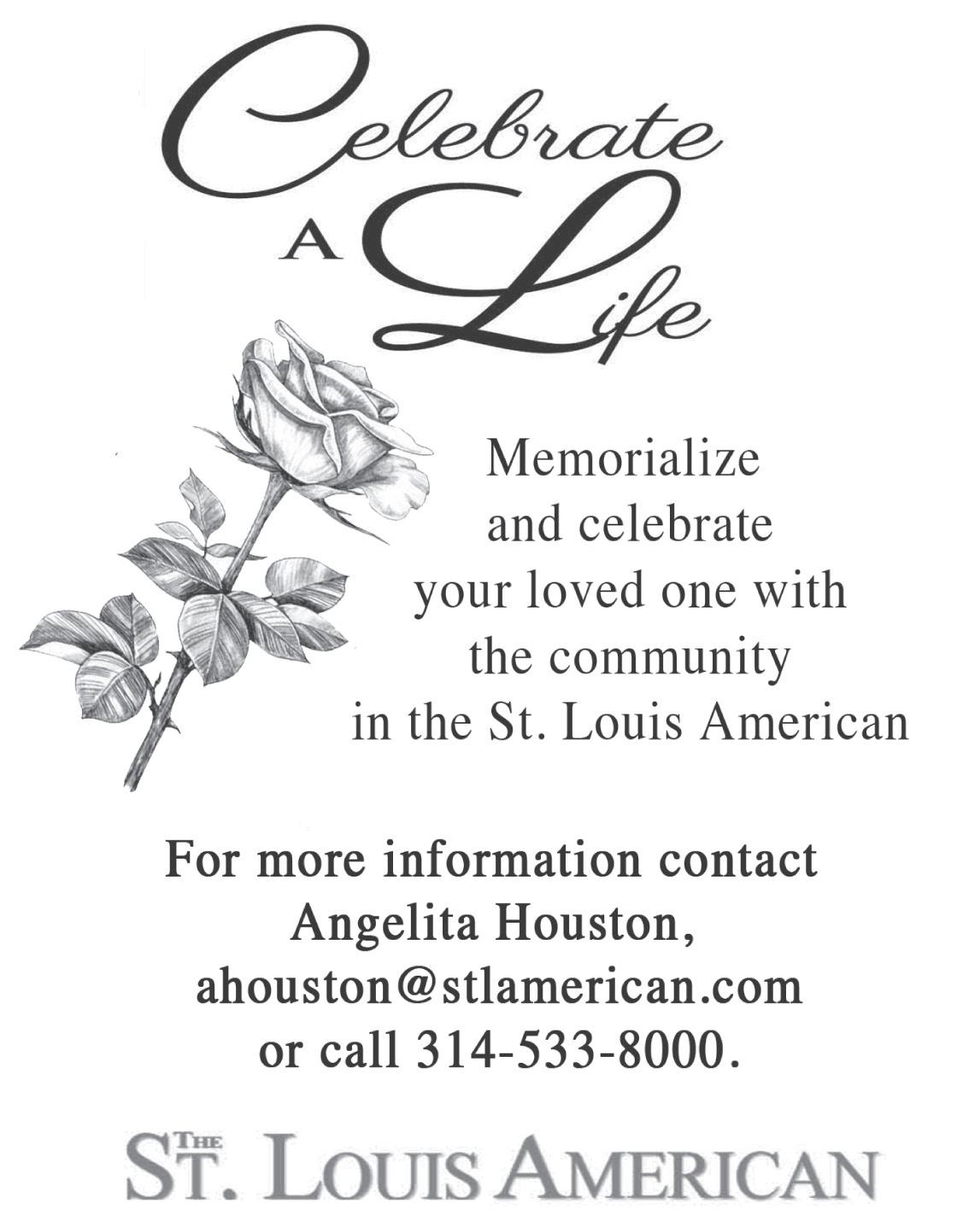
Continued from B1
your knee and your privilege off my neck,” Lewis sang in her latest YouTube original
Continued from B1
Boston. During a year abroad at Berklee’s Valencia, Spain campus, she met producer Javier Limon, who cultivated her singing style and produced her first album “Black Angels.” She also met Heather Rivas at that time, and along with Mario Taddeo Jr., formed the band Her Say and released the album, So It Goes in 2017.
Continued from B1
in the store’s parking lot. The crowd continued to grow until eventually a shiny all-black 2000 Ford Explorer rolled up with dubs intact as mentioned in Country Grammar. The doors of the SUV opened, and the large crowd began to absolutely lose it. Even in my youthful oblivion, it was clear to me this person was the reason everyone was congregated.
As the song dominated the charts and the video dominated music television, it created great pride for our city and many people wanted close proximity to the success. At the time, it was not at all an uncommon thing for people in the city to share how they were somehow related to or acquainted with Nelly or another one of the St. Lunatics. “Nelly is my second cousin on my daddy’s side” or “Murphy Lee used to stay right by my granny’s house” are the stories you would hear people tell. Some of the stories being completely true; some not.
The song’s catchy melody and its massive success deeply imprinted the chorus in our psyche.
When the album, “Country Grammar” was released on June 27, 2000, it cemented the moment as much more than just a hot song. Nelly was attempting to carve a real stake for the city of St. Louis to be included in hip-hop discourse. The album became a multi-platinum success within months; spending weeks at #1 on the Billboard 200 chart. All of the songs included on Nelly’s


“Take Your Knee Off My Neck,” which went viral soon after it debuted three weeks ago. The clip received more than a quarter-million likes on the Instagram account of popular urban entertainment news and gossip outlet The Shade Room.
Tonina’s skill and talent as a musician, singer and songwriter led to a name drop by President Barack Obama.
Obama, who is known for releasing lists of books and music he’’s enjoyed at the end of the year, named Saputo’s song “Historia De un Amor” one of his favorites of 2018. “My forever president put my song ‘Historia De un Amor’ on his Best songs of 2018 list! I fell down the stairs. Come back Barack,” Tonina said via Facebook upon learning the news.
Lewis performed the song during an interview with ET Canada. Afterwards, she discussed the horror of Floyd’s death being witnessed by the masses, police brutality against African Americans and systemic racism.
“My people took the hoses
Familiarize yourself by watching some of her videos on your favorite music platform. One of my favorites is Black Angels, a song imploring artists to paint black angels so that people know there are good black people in Heaven. A thought that is quite relevant in these current times. Another is the love song titled Time, a collaboration with Kevin Bedford Her latest release Papaya is an upbeat Latin dance song that will have you wishing for a tropical get-away. Maybe when we feel safe to fly again

n When the album, “Country Grammar” was released on June 27, 2000, it cemented the moment as much more than just a hot song.
4-track demo that led to his Universal deal became album singles with accompanying videos: “Country Grammar,” “E.I.,” “Ride wit Me,” and Batter Up. The massive success of the album led to unprecedented opportunities for Nelly – especially when one considers he was a rap newcomer. These extraordinary opportunities included a performance on the “Tonight Show with Jay Leno,” a half-time performance at Super Bowl XXXV, and an MTV Video Music Awards appearance that was originally scheduled to be a red-carpet performance but was later upgraded to the mainstage. Nelly’s rise to superstardom
occurred simultaneously as St. Louis was also thriving in the sports world. What was even more satisfying than the city’s sports victories, was the synergy between Nelly and the hometown franchises with Country Grammar serving as a soundtrack for it all.
From the start, Nelly made his hometown known just as much visually as he did audibly in his music; donning a Blues pullover and Cardinals jersey in the Country Grammar music video and riding in a St. Louis Rams-themed Cutlass in the E.I. video. It made for a very unified moment when the local sport teams embraced Nelly right back with his music being

and the dogs on the front line in the ’60s. And that should have been enough! But obviously it was not,” Lewis said. “And now those kids, the millennials, they have to rise up and fight the same war.”
Tonina is a delight to listen to and will definitely create an evening of summer magic by way of Facebook.
RSVP Jazz Supper Club will present Tonina at 8:30 p.m. on Tuesday, June 30 via Facebook Live from the Sheldon Concert Hall. For more information, visit https://www.facebook.com/ events/488078585313401/ For more information, on Tonina, visit www.iamtonina. com.
played in locker rooms and during games, him throwing out the first pitch at Cardinals games, and standing on the sidelines at St. Louis Rams games. There are very few things that can bring people together like music and sports. The triumph and synergy Nelly and the hometown franchises were pumping into the city also brought about a sense of racial harmony amongst their diverse fans in the community.
In the years since the album, Country Grammar was released, it received Diamond certification by the RIAA (Recording Industry Association of America); denoting ten million units shipped in the U.S. With the enormous success of his debut and its follow-up, “Nellyville,” Nelly has become a household name and has been immortalized not only in hip-hop culture, but in popular culture as well. Nelly’s huge stake in pop culture was validated through opportunities like him being featured in Got milk? advertisements, his likeness appearing in the videogame NBA Street Volume 2, and his music appearing in Bud Light commercials.
As he cemented himself in popular culture, Nelly simultaneously brought an unprecedented amount of attention to the city of St. Louis. Along with the St. Lunatics, he broke the barrier for STL acts to follow: Toya, Pretty Willie, Chingy, J-Kwon, Huey, Jibbs, Ebony Eyez, Penelope Jones, Smino, Bari, etc. Former Mayor Francis Slay recognized Nelly’s efforts for the city by proclaiming May 13, 2001 to be Nelly Day in St. Louis during a presentation at a Cardinals game. More than the multi-platinum success, more than the appearances on prestigious stages, more than the synergy with the sports world, more than the global popularity, what means the most to me about Nelly today are the possibilities he made real for me. It’s one thing to witness someone ascend to superstardom, but it’s another thing to see someone who looks like you ascend to superstardom. It’s a completely different, personal experience to witness someone who looks like you and emerged from the same corners of life as you ascend to success. This was Nelly’s role in my upbringing. These days, I no longer live in St. Louis, but my country accent remains and often leads people to ask where I’m from. Nelly is usually the next thing they bring up in conversation. He served as many people’s introduction to the city’s culture. People mention how they loved the music, how they emulated his style by wearing a band-aid as a fashion accessory, how fascinated they were by the region’s accent and dances.
Just as Nelly’s introduction to the world brought unprecedented attention to St. Louis, it also broke way to a very special, harmonious moment in my city. I can’t speak for what occurred prior to my existence, however, this very vibrant moment in the city is what I consider to be the golden era in St. Louis. It is a time I wish I could’ve been able to bottle up so I could revisit it whenever I felt the need.
Vango Jones is an art director, set decorator and filmmaker based in New York City.

We have work to do in our community and our organization
By the Missouri Historical Society For The St. Louis American
The Missouri Historical Society is committed to improving the ways we tell history. We believe our mission is to tell history in more complete and more complex ways by bringing you stories that have often been left out of the historical narrative and by giving you new insights into stories you thought you knew. We also believe in re-examining our own history and our own commitments to the staff who share St. Louis’s past. Two weeks ago, our Board of Trustees and Subdistrict Commissioners joined with us to adopt a Commitment to Racial Equity, which outlines our dedication to diversity, accessibility, and inclusion.
This is a commitment to the MHS staff but also a commitment to the St. Louis community. We believe the more voices we have researching, collecting, and sharing history, the more voices we will be able to amplify from history, giving you a more complete view of our shared past. The Missouri Historical Society occupies a unique place in the region as a leader in the exploration of our shared history. That history has its triumphs and its pains, its democratic ide-
als, and its injustices. We have been driven apart by violence against Black people caused by persistent racial inequality. Peaceful protests have been growing to waken our nation to change, and disruptive misbehavior by a few will not cloud our vision for what’s right.
Education and effective activism can change the nation’s and our community’s understanding of systemic racism. We have work to do in our community, but most important, we have work to do within the Missouri Historical Society to reaffirm that we are an organization that respects differences and embraces and advances racial equity.
Further, the Missouri Historical Society recommits to a core value of practicing diversity and inclusion, creating a culture of equitable practices. We will commit financial and human resources to evaluate existing staff structures and practices, with a goal of eliminating barriers to diversity, equity, inclusion, and accessibility.
Finally, the Missouri Historical Society will re-examine its efforts to create a welcoming environment for all visitors; build a work environment that is congenial, accessible, and inclusive; and, within the bounds of civility and respect, encourage meaningful dialogue about challenging topics from diverse perspectives. We commit to a process of listening attentively to one another and leveraging best practices and resources across our organization to promote a culture of inclusion where individuals from all racial and ethnic identities; ages; nationalities; social and economic statuses; sexual orientations; gender identities/expressions; religious, political, and ideological perspectives; and abilities are able to be engaged, feel valued, and thrive.
Introducing Vivent Health, founded on the combined expertise of AIDS Resource Center of Wisconsin, Rocky Mountain CARES and St. Louis Effort for AIDS. And steadfastly dedicated to serving anyone and everyone affected by HIV through our comprehensive prevention, care and treatment programs. Learn more at ViventHealth.org

By Jennifer Poindexter Of Explore St. Louis
Summer has officially arrived. While the experience of summer will be a little different with social distancing, there will be no shortage of fun!
Health and safety, of course, remain the number one priority. St. Louis Mayor Lyda Krewson and St. Louis County Executive Sam Page announced that summer camps in the city and the county will be allowed to open provided they follow safety protocols, including designing activities to allow for social distancing, holding limited field trips, no overnight or residential camps, proper use of face coverings when social distancing is not possible, providing at least three opportunities for hand washing throughout the day, staff use of face coverings, detailed cleaning and sanitizing procedures, and limited enrollment.
Activities through the summer include both in-person and virtual experiences.
Those offering in-person camps include The Gateway Region YMCA, The Magic House, Miss Kelly’s Gym, COCA, Little Medical School, Sweetology, Fox Performing Arts Charitable Organization, Yucandu Art Studio, Artscope, and many others.
Those offering virtual experiences include Lavner Camps, a nationwide camp organization offering tech and STEM camps through Wash U; Bricks 4 Kidz, utilizing LEGO kids to build a love for STEM-related activities; Little Medical School with areas of focus around pediatrics, sports medicine, wilderness medicine and veterinary medicine.
Organizations throughout the area are also providing invaluable resources and options for summer activities, including:
Boys and Girls Clubs of Greater St. Louis Plans are moving forward to operate summer camps for as many children possible throughout the Great St. Louis region. The Clubs are working diligently with area school districts, elected officials, and health providers to strictly follow all health and safety guidelines.
Summer campers who are interested in writing, producing or singing will enjoy the Music Studio program led by Grammy Award-winning producer/songwriter Alonzo ”Zo” Lee. Students will be fully engaged in the songwriting/ recording process and create a song from start

to finish. While youth who aspire to become coders, graphic designers, 3D animators or game developers will have access to our newly opened Best Buy Teen Tech Center at the Herbert Hoover Club. The center is an interactive and innovative fully equipped space with everything needed to engage youth ages 12-18 with STEAM activities including a music studio, 3D printer, t-shirt press maker, coding stations, state of the art computers, monitors and virtual reality headsets.
Blueprint4SummerSTL. There is a plethora of summer activities throughout the area easily accessible by Blueprint4SummerSTL. Founded by the Clark-Fox Foundation, Blueprint4SummerSTL is a website and free app that puts hundreds of summer classes, camps and activity programs at the fingertips of St. Louisarea families. Through the mobile app or website, you can do a search based on any number of preferences such as age, gender, interests, price point and zip code. You can also find information on day camps, sleep-away camps, and sports camps; art music and science programs; and academic enrichment courses in STEM.
Don’t miss out on all the fun to be had this summer. Check out Passport to STL on the Explore St. Louis website for more information on places that are reopening and fun activities for the whole family. It’s time to Re-Explore St. Louis … responsibly. Jennifer Poindexter is director of Convention Services at Explore St. Louis.

The Rt. Rev. Deon K. Johnson was ordained as the 11th bishop of the Episcopal Diocese of Missouri, representing more than 10,000 worshipers from 42 parishes throughout the eastern half of the state. He is the first black, openly gay bishop in the diocese’s 179year history. “To find ourselves in this moment, the ancestor of a slave, to be called to be the Bishop of Missouri –God is good!” said Bishop Johnson during his ordination service. “To the people of Missouri, we have a whole new story to tell and a whole new boldness to tell it with. So, I look forward to the adventure.”
n “Fear would tell us that dignity belongs to some and not to others. As followers of Jesus, we must live and know that perfect love casts out fear.”
diocesan Facebook page. Johnson succeeds the Rt. Rev. George Wayne Smith, who served the diocese as bishop for 18 years before retiring at the end of April. Johnson’s ordination as bishop was delayed nearly two months as church leaders revised plans to accommodate public health requirements caused by the coronavirus pandemic.
– The Rt. Rev. Deon K. Johnson
Before two dozen worshipers and Episcopal clerics at Christ Church Cathedral in downtown St. Louis, Johnson was consecrated as the spiritual leader of eastern Missouri’s congregants during a service that was livestreamed on the
At their convention on November 23, delegates chose among three candidates and elected Johnson by an overwhelming majority on the first ballot. He began his ministry in the diocese on March 1, beginning what turned out to be a longer than expected transition period with his predecessor.
Following the killing of George Floyd at the end of May, Johnson has been visible throughout the community among nonviolent protesters. He led a rally at St. John’s Tower Grove in solidarity with the members of St. John’s

The Rt. Rev. Deon K. Johnson is the first black, openly gay bishop in the Episcopal Diocese of Missouri’s 179year history.
Church near Lafayette Park in Washington, D.C.—the scene of a police action that relocated protestors on June 1.
“Fear would tell us that dignity belongs to some and not to others,” he said following the rally. “As followers of Jesus, we must live and know that perfect love casts out fear. We must, in the words of the Prophet Micah, ‘do justice,

love mercy, and walk humbly with our God.’” Johnson—an immigrant from Barbados—has served as a priest in the Episcopal Church since 2003, most recently as rector of St. Paul’s Episcopal Church in Brighton, Michigan. He and his husband now live in the St. Louis area. They have two children.
He hasn’t moved. You have.
Having a relationship, a personal relationship with Christ has a lot to do with making conscious choices.
Like the child who responds in silence to the parent who states, “I know you know the difference between right and wrong” or “I know you know you weren’t raised that way.”
The silent child knows in his or her heart that the parent is correct. No answer is the answer. The same thing happens with God. No matter the situation or circumstance, when you acknowledge God and your relationship to Him, you cannot use the excuse that you don’t know, you didn’t have control or your sin was an accident.

You can deny it if you want to but again no answer is an answer and even indecision is a decision. Faith in the face of temptation doesn’t mean we will automatically make the correct choice. More often than not, we’ll let God down as well as ourselves. A true understanding of faith, however, won’t keep us down. Through faith and that personal relationship with God, each and every one of us can and must get up and try again. This personal relationship makes you aware of the distance between you and God, much like that of the distance between you and someone you love.
You can feel it. Absence does make the heart grow fonder. Time and distance from God bring you no inner peace and you know it. Until you submit and admit to this very personal reality, you cannot and will not recognize that you have a choice.
We always do. We have the power to remove the barriers and get closer to God. One thing is for sure. You do know when you’re heading away from God. He hasn’t moved. You have.
“Blessed are they whose transgressions are forgiven; whose sins are covered. Blessed is the man whose sin the Lord will never count against him.” Romans 4:7-8.
All things are possible to those who love the Lord. As a child who knows he has disappointed a loving parent, there is no joy until the relationship is in balance again. Or, the couple who realizes anger and argument cannot last forever. Things must be resolved in order to have conjugal peace.
Walk with God and I assure you, you’ll know when you’re out of step. You’ll feel it and it will make you miserable. When you know you wrong, just reach and try to touch God and I guarantee you, God will be there before you ever actually move your hand.

With Alvin A. Reid
The FBI concluded swiftly that a rope fashioned as a noose in racer Bubba Wallace’s garage stall was a “door pull,” and not and intentional act of hate directed at the driver.
The “I told you so,” crowd is in full glory and many of its members aren’t hiding their racist attitudes. Unfortunately, Wallace has been tabbed as the bad guy – as if he wasn’t before – and he, Black Lives Matter, the media and NASCAR are under verbal attack.
Wallace isn’t exactly buying the garage door pull explanation.
He told CNN’s Don Lemon on Tuesday night, “the image that I have and I have seen of what was hanging in my garage is not a garage pull.”
“I’ve been racing all my life. We’’ve raced out of hundreds of garages that never had garage pulls like that. So people that want to call it a garage pull and put out old videos and photos of knots as their evidence, go ahead, but from the evidence that we have, that I have, it’s a straightup noose.
of the nation’s top AfricanAmerican-owned companies, World Wide Technology, is one of the biggest names in auto and truck racing.
He is a major sponsor of Wallace’s No. 43 NASCAR team, with Wallace being NASCAR’s lone black driver.
Steward was proud of his driver when he dared challenge the constant appearances of Confederate flags at NASCAR events. Less than a week later, NASCAR prohibited the display of these flags anywhere on the grounds of tracks where events would take place.
Before the noose was found on Sunday, Steward’s mother had just passed away. He could have easily avoided commenting, but he released a statement supporting his driver.
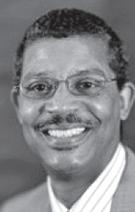
“Bubba continues to prove that he is both a top-tier NASCAR driver and a first-rate individual who demonstrates admirable courage by taking on these major symbols of racism,” Steward said in the release.
“The FBI has stated it was a noose, over and over again. NASCAR leadership has stated it was a noose. I can confirm that.
“I actually got evidence of what was hanging in my garage over my car around my pit crew guy to confirm that it was a noose, and never seen anything like it. I talked to my crew chief about it. I said, ‘Is this something?’ Like, I wanted to make sure we weren’t jumping the gun. And I said, ‘This isn’t a knot.’ Noose, knot or whatever, the incident brought out the best in so many people it cannot be ignored.
Let’s start close to home.
As his early pursuit of entrepreneurial success began, David Steward found himself in the unenviable position of having a car re-possessed.
Now, the black billionaire who is founder and chairman of one
“I am honored to call him a friend and fully support him. The time for change is now and we need the momentum created by Bubba and others to lead all people to a better place.”
Regardless of how the situation turned out, those are powerful words from a powerful man.
Steward also supports local racing, and World Wide Technology Raceway in Madison, Illinois, is proof of his dedication to the sport.
Curtis Francois, owner and CEO of World Wide Technology Raceway, initially called the noose incident “atrocious” on Monday.
“Bubba Wallace has been a part of our racing family here at the track since 2013. We have worked closely with him throughout his career and have always stood behind him as he pursued his dreams. His maturity and poise in handling this situation shows that he is a strong young man who is

A
respected by those of us who have the pleasure of calling him a friend,” he said.
Wallace did not know of the noose until late Sunday afternoon after the race in Talladega was postponed until Monday because of foul weather. He said the suspected horrible act would not deter him from his mission of winning races and landing a NASCAR season championship. He would finish 14th at Talladega, as he was low on fuel late in the race.
NASCAR had ruled that 5,000
fans could attend the race.
Dozens of black supporters, many who drove more than 100 miles from Atlanta, showed up Monday and were in the stands.
After the race, Wallace took off his American flag mask, walked across the track to the stands and emotionally saluted those fans. Many were wearing
Black Lives Matter shirts.
“This sport is changing. The pre-race deal was probably one of the hardest things I’ve ever had to witness in my life. From all the supporters, from drivers to crew members, everybody here, the bad-ass fan base, thank you guys for coming out. This is truly incredible, and I’m glad to be a part of this sport.”
The “pre-race deal,” Wallace referred to, began with a thought by superstar driver Jimmie Johnson. He said all drivers should stand with Wallace during the national anthem. Kevin Harvick suggested taking it further. He and the other drivers then pushed Wallace’s No. 43 car to the front of the racing grid with pit crew members and other racing officials walking behind them. Wallace was reduced to tears.
InsIde sports
With Earl Austin Jr.
An emotional Monday
The noose incident was the major sports story internationally from Sunday evening through Monday.
NASCAR president Steve Phelps began the day with a press conference in which he again said anyone involved with the act would be banned from his sport permanently.
“Obviously, this is a very, very serious act. We take it as such. We will do everything in our power to make sure that whoever has committed this act comes to justice and comes to light and we rid this type of behavior from our sport,” he said.
Once the investigation was concluded, NASCAR released this statement:
“The FBI has ... determined that Bubba Wallace was not the target of a hate crime. The FBI report concludes, and photographic evidence confirms, that the garage door pull rope fashioned like a noose had been positioned there since as early as last fall. This was obviously well before the 43 team’s arrival and garage assignment. We appreciate the FBI’s quick and thorough investigation and are thankful to learn that this was not an intentional, racist act against Bubba. We remain steadfast in our commitment to providing a welcoming and inclusive environment for all who love racing.”
Mom’s sage advice
The incident allowed much of the world to meet Wallace’s mother, Desiree, who said her son has faced racism throughout his racing career.
“This is not his first incident,” she said Monday on Sirius XM’s “Joe Madison Show.”
“If he gets into an incident with another driver, they’re quick to throw out the n-word. He’s been told he doesn’t belong. We’ve been through all of that.”
It was one of my first thoughts late Sunday when I first learned of the matter. “Please don’t let his race team be involved,” I said to myself.
Desiree said her son told her, “it was someone inside the walls of NASCAR.”
“I’m just praying that it’s not one of his team members.”
Of course, the conspiracy theorists are trumpeting the “it was staged” theme and Wallace was the mastermind. Ridiculous.
Burn rubber on racism
Before the conclusion of the investigation, Ryan McKee, an ESPN senior writer who covers NASCAR, used terms most journalists – and me – would shy away from in challenging those that were behind this hate crime and cling to the Confederate flag.
“To the one(s) who thought they could dip into the tired, old 1934 or 1964 racist playbook and elicit fear by placing a symbol of hate -- a noose, for heaven’s sake -- in the garage stall of a Black race car driver, I really need to make sure you are paying attention to what I have to say to you,” he wrote.
“Oh, and the grown adult or adults who spent hundreds of dollars to fly a “DEFUND NASCAR” banner and Confederate flag behind a plane over Talladega, you should listen up too. Same for you rednecks who drove a parade of pickups around the perimeter of the racetrack with that same flag flying out of the beds of your 4x4s.
“It didn’t work. Congratulations. You failed. In fact, what you accomplished was the complete opposite of what you set out to do.”
She said her advice to her son is, “You don’t throw back at them. You just get in that race car and win. That’s the way you fight back.” She also brought to light one of my personal worst fears. Phelps said during his press conference, “I can’t speak for those on social media who would say this is a staged event. For those who would think this is staged, I don’t even know where to go with that frankly.”
I have just completed my 25th year of covering high school sports at the St. Louis American. In the coming weeks, I will be providing you with some of my greatest memories from the past 25 years. For my first installment, I will be taking a look at some of the biggest events that I had the honor of covering.
Rivalry Day (1995): On a fall day midway through football season, I had the choice to attend two great rivalry games. On the Missouri side, there was the annual clash between Hazelwood Central and Hazelwood East. On the Illinois side, perennial power East St. Louis was taking on rival East St. Louis Lincoln. My decision was easy. Why not attend both games. The day started in North County as I took in the first half of East vs. Central. East went on to take a victory over its rivals from Central. At halftime, I hopped into
my car and headed to the East Side. When I arrived inside of Jordan Stadium, I was greeted with an incredible sight. One side of the stadium was filled with people clad in orange and blue, the colors of the East St. Louis Flyers. The other side was filled with orange and black, the colors of the Lincoln Tigers. It was quite possibly the most electric high school football atmosphere that I’ve experienced here in the St. Louis area. Adding more spice to the day was the fact that Lincoln actually had a chance to upset East St. Louis on this day. The Tigers actually led 19-7 in the fourth quarter, but East Side rallied with two fourth quarter touchdowns and escaped with a dramatic 21-19 victory.
McDonald’s All-American Game (1995): The Kiel Center in downtown St. Louis was the host for the nation’s most prestigious postseason high school All-Star basketball
game. The game featured a host of future National Basketball Association greats such as Kevin Garnett, Paul Pierce, Vince Carter, Chauncey Billups and Antawn Jamison. There was also a Show-Me State flavor as St. Louisan Ryan Robertson of St. Charles West and Kansas City’s Derek Hood for Central High were also participants in the game. The day before the game, I had the honor of serving as a judge in the slam-dunk competition, which was held at the University of Missouri-St. Louis. Vince Carter won the contest as he brought the house down by taking off from the free throw line to throw down a dunk.

Earl Austin Jr.
MLK Basketball Classic (1999): The St. Louis Gateway Classic annually put on a tremendous basketball event on
Martin Luther King Day. What started off as an event at smaller high school venues ended up at the Kiel Center. The 1999 event was the biggest as it featured the “Border War” between area powerhouse teams Vashon and East St. Louis. More than 15,000 fans battled through a snowstorm to get downtown to see this big showdown. East St. Louis was led by All-American performer Darius Miles while Vashon was led by standouts Joel Shelton and Jimmy McKinney. My friend Maurice Scott kept the crowd lively with his passionate voice as the public address announcer and the game was exciting from start to finish. In the end, it was East St. Louis that took the victory and the bragging rights for a season.
Chaminade vs. McCluer North on ESPN (2011): It
is always a special honor when ESPN comes to town to broadcast a high school basketball game. That was the case when top-ranked Chaminade took on McCluer North at a jam-packed Lindenwood University. Chaminade was led by National Player of the Year Bradley Beal while McCluer North was led by super scorer B.J. Young. On this day, it was Chaminade who dominated the action as Beal scored 40 points to lead the Red Devils to a 77-56 victory. The two teams would meet in a rematch in March in the state quarterfinals with McCluer North taking a 57-56 victory en route to the state championship.
CBC vs. East St. Louis, Gateway Scholars Classic (2016): The Gateway Scholars Classic is a high-level football event that is held annually at Clyde C. Jordan Stadium in East St. Louis. The 2016 clash between East St. Louis and CBC featured a pair of future
state-championship teams with tremendous amounts of talent. It was an electric atmosphere as the stadium was filled to capacity and the fans were treated to a great show that wasn’t decided until the final seconds of the game. A 10-yard touchdown run by Jarrell Anderson with 10 seconds left gave East St. Louis a thrilling 32-28 victory.
Trinity vs. Lutheran North Playoff Showdown (2017): There was a year-long buildup on social media for this game between these two smallschool football powers that would decide a district championship. People were on the parking lot at Lutheran North hours in advance. An estimated crowd of 5,000 showed up at Lutheran North for a game that featured two teams with high-level talent and contrasting styles. The game exceeded the hype as Lutheran North outlasted Trinity 48-46 in an instant classic.



Urban Strategies, Inc is seeking applicants for the Senior Case Manager position for St. Louis’ Near North Side Choice Neighborhood Plan and a Senior Staff Accountant position in our Central Office. To view the full job descriptions visit, https://bit.ly/3bmm1li
CLEAN-TECH COMPANY IS INTERVIEWING FOR VARIOUS LOCATIONS!
Every Thursday 1PM-5PM! #211 South Jefferson Avenue, St. Louis, MO 63103
JOBS AVAILABLE! WE ARE HIRING! Apply online www.cleantechcompany.com/ careers
COORDINATOR – IS –EDI OPERATIONS
Under minimal supervision, the Coordinator – EDI Operations role is accountable for quality and analysis of production EDI data. This position partners with assigned business units and helps to provide accurate data to support the best possible business decisions. The ideal EDI Operations Coordinator will identify and drive continuous improvements in the quality and availability of EDI data. To apply, please visit: https://www.safetynational.com/ careers-page/
METROPOLITAN ST. LOUIS
SEWER DISTRICT
Notice is hereby given that the Metropolitan St. Louis Sewer District Requests for Quotes, Bids and Proposals are posted online for public download. Please navigate to www.msdprojectclear.org > Doing Business With Us > View Non-Capital Bids (commodities and services) or >Visit Planroom (capital construction bids)
Metropolitan St. Louis Sewer District is an Equal Opportunity Employer.
CITY OF ST LOUIS
DEPARTMENT OF HUMAN SERVICES
REQUEST FOR PROPOSALS (RFP)
Beginning June 11, 2020 Requests for Proposals for FY2020 Emergency Solutions Grant – Coronavirus (ESGCV) are available at: https://www.stlouis-mo.gov/ government/procurement/ or by contacting BickfordA@stlouis-mo.gov
The deadline for submitting proposals is 4:00 p.m., July 7, 2020.
Bids for Repaint Hangar Floor, Missouri National G u a r d WA F B AASF Hangar, Knob Noster, Missouri, Project No. T2008-01 will be received by FMDC, State of MO, UNTIL 1:30 PM, 6/25/2020 via MissouriBUYS. Bidders must be registered to bid. For specific project information and ordering plans, go to: http://oa.mo. gov/facilities
Paric Corporation is seeking proposals for the following project: Lottes Health Science Library –1st Floor Phase One Renovation for the University of Missouri.
This is an approximately 7,000 sf renovation of the existing School of Medicine and Anesthesiology offices.
The scope of work includes but is not limited to demo, carpentry, casework, doors/frames/hardware, drywall, ceramic tile, ACT, carpet, painting, fire protection, plumbing, HVAC and electrical.
This project has a diversity participation goal of 10% MBE and 10% combined WBE, DBE, Veteran Owned Business and 3% SDVE.
Bids for this project are due on June 30, at 1:30 p.m. For any questions or would like to find out more detailed information on this opportunity, please contact Evan Chiles at 816-878-6003 or emchiles@paric.com.
All bids should be delivered to Paric via e-mail (bids@paric.com) or fax (816-878-6249). PARIC CORPORATION IS AN EQUAL OPPORTUNITY EMPLOYER
Inspects residential and commercial property for code compliance, including electrical, plumbing and mechanical inspections. Performs plan reviews and issues permits. Other duties as assigned, including acts as the Building Commissioner in the absence of the Director. Must have 5 years experience as an inspector; plan review experience, some supervisory experience; valid driver’s license; no disqualifying criminal history. IBC certified. Starting salary $40,572.00 (GS16-C) NO RESUMES ACCEPTED WITHOUT COMPLETION OF OUR APPLICATION! Completed applications may be mailed, emailed to jobs@cityofjennings.org or faxed to 314-388-3999. Applications accepted until the position is filled. Please include copies of any certifications.
For more information and to apply, visit https://www. desmet.org/about/careers.
EOE M/F/D/V
Lincoln University of Missouri is currently accepting qualification statements for professional services for site design and erection of greenhouses until July 16, 2020. Please submit all documents to lufacilitiesplanning@lincolnu.edu. For additional information, please contact the Office of Facilities and Planning, 309 Young Hall, Lincoln University, Jefferson City, Missouri (573) 681-5084.
Notice is hereby given that The Metropolitan St. Louis Sewer District (District) will receive sealed bids for Picardy Sanitary Replacement (IR) under Letting No. 13388015.1, at this office, 2350 Market Street, St. Louis, Missouri 63103, until 02:00 PM on Friday, July 24, 2020, at a place designated. Bids will be received only from companies that are pre-qualified by the District’s Engineering Department for: Sewer Construction - St. Louis County Drain Layers License Required Plans and Specifications are available for free electronic download. Please go to MSD’s website and look for a link to “ELECTRONIC PLANROOM.” Plans and Specifications are also available for viewing or purchase at Cross Rhodes Reprographics located at 1712 Macklind Avenue, St. Louis MO 63110. All bidders must obtain a set of plans and specifications in order to submit a bid in the name of the entity submitting the bid. The Metropolitan St. Louis Sewer District is an Equal Opportunity Employer.
The St. Louis County Circuit Clerk’s Office has several vacant Apprentice Court Clerk/Court Clerk positions in each of our departments. These positions are full-time positions working in a court within the Missouri State Court System, using an electronic filing system. We are looking for candidates who are interested in entry-level positions working in a court setting and who possess excellent office and customer service skills.
SALARY: $2,224.00 - $2,383.00 per month depending on qualifications +State of Missouri benefits.
MINIMUM QUALIFICATIONS:
Applicant must have an Associate’s Degree in a related field or at least 60 semester hours from an institution of higher learning and one year of varied administrative experience performing a wide range of technical office duties. (Equivalent combination of relevant education and experience may be substituted on a year for year basis provided a high school diploma or GED has been obtained). An assessment of data entry skills will be given.
TO APPLY: Visit the following website and complete an online application, https://wp.stlcountycourts.com/
HIRING FULL AND PART-TIME PERSONAL CARE AIDES call Karen at 314-298-7002.

Notice is hereby given that the Metropolitan St. Louis Sewer District is proposing to procure temporary help services from Amitech Solutions in an effort to support the IT Technology Plan. The District is proposing single source procurement for this service because it does not have the internal expertise to fulfill this Information Technology role. Any inquiries should be sent to strenz@stlmsd.com.
Metropolitan St. Louis Sewer District is an

NOTICE TO CONTRACTORS
a link to “ELECTRONIC PLANROOM.” Plans and Specifications are also available for viewing or purchase at Cross Rhodes Reprographics located at 1712 Macklind Avenue, St. Louis MO 63110. All bidders must obtain a set of plans and specifications in order to submit a bid in the name of the entity submitting the bid.
The Metropolitan St. Louis Sewer District is an Equal Opportunity Employer.
Advertised herein is subject to the Federal Fair Housing Act, which makes it illegal to advertise any preference, imitation, or discrimination because of race, color, religion, sex, handicap, familial\status, or national origin, or intention to make any such preference, limitation, or discrimination.“We will not knowingly accept any advertising for real estate which is in violation of the law. All persons are hereby informed that all dwellings advertised are available on an equal opportunity basis.”
Call Angelita Houston at 314-289-5430 or email ahouston@stlamerican.com to place your rental/real estate ad today!


